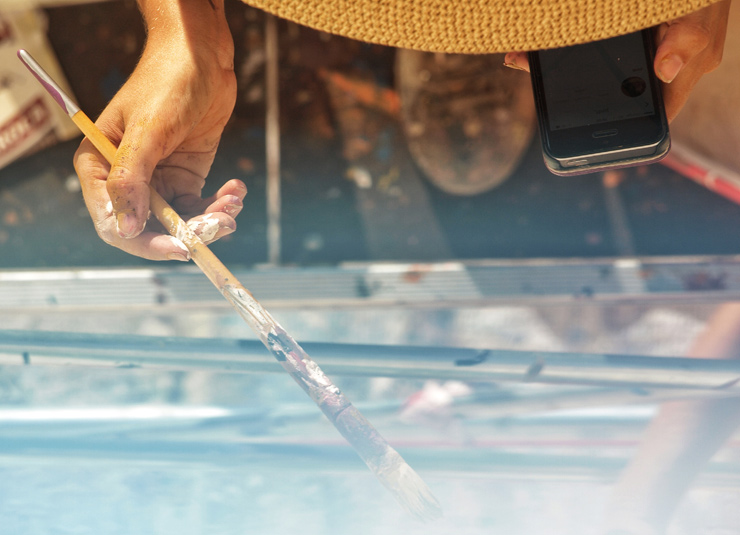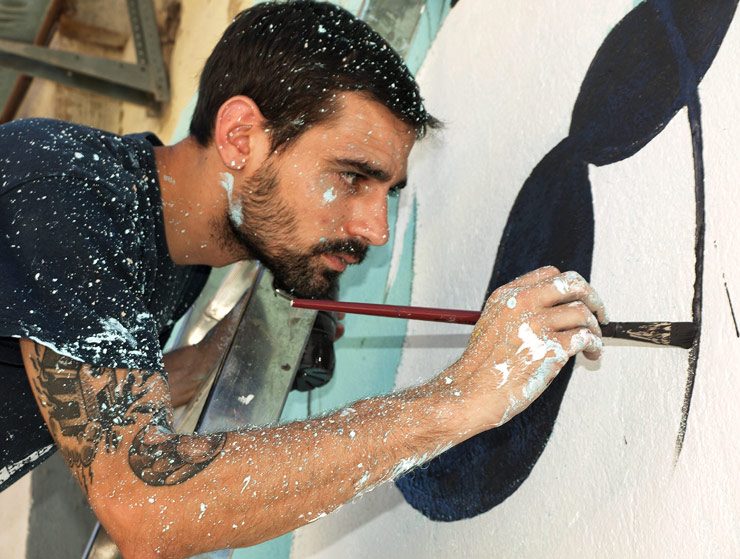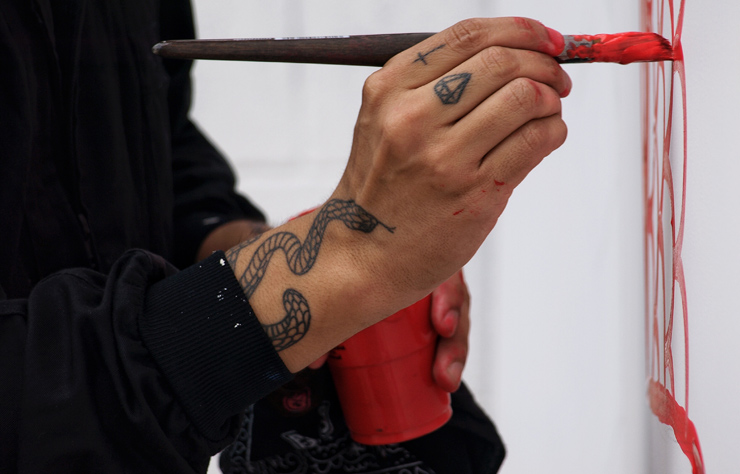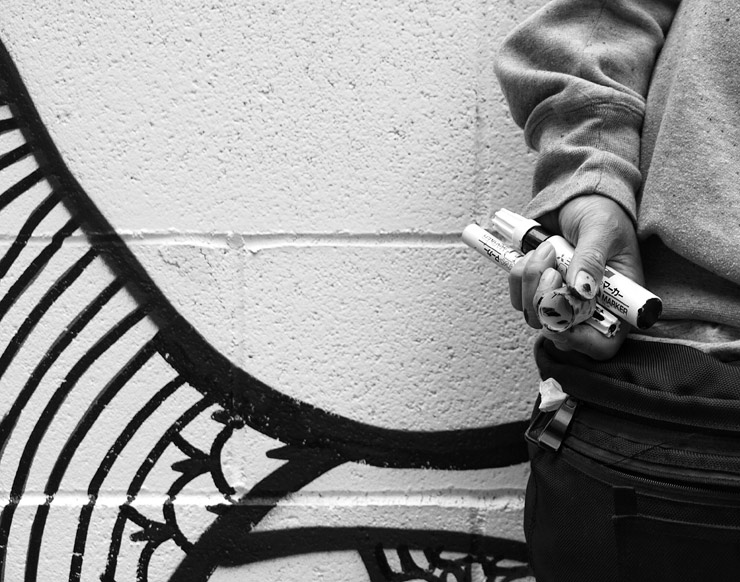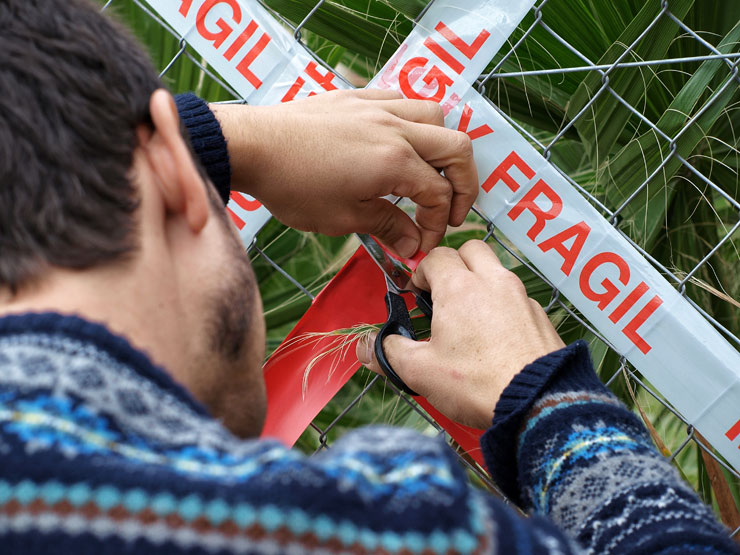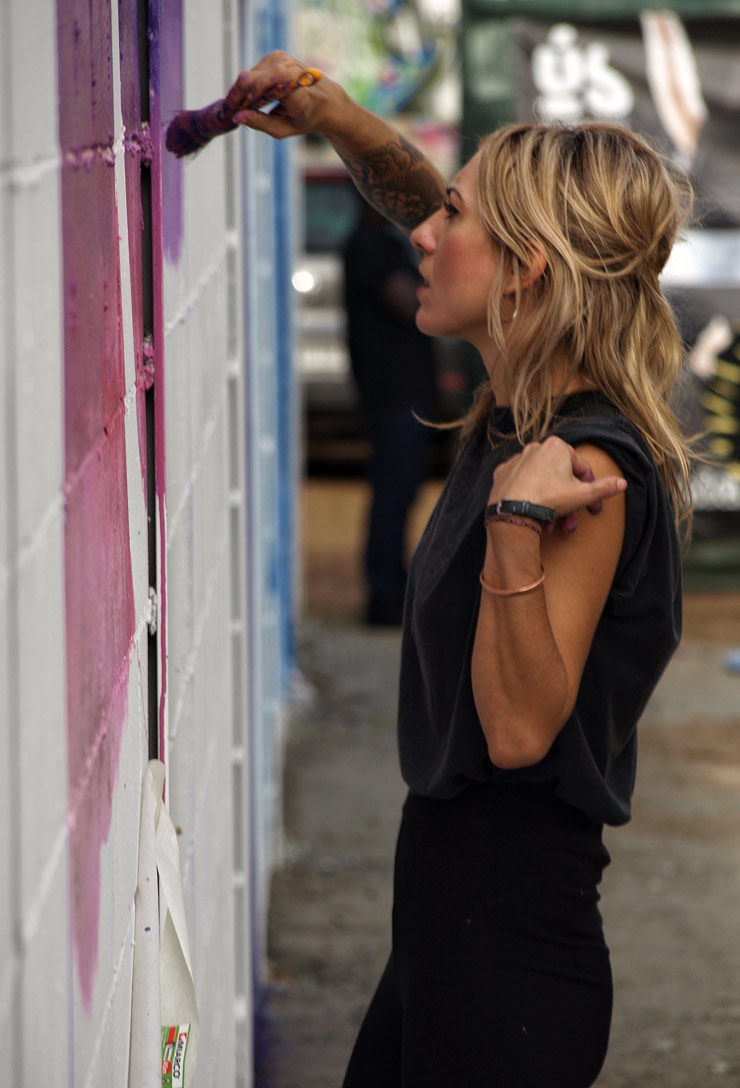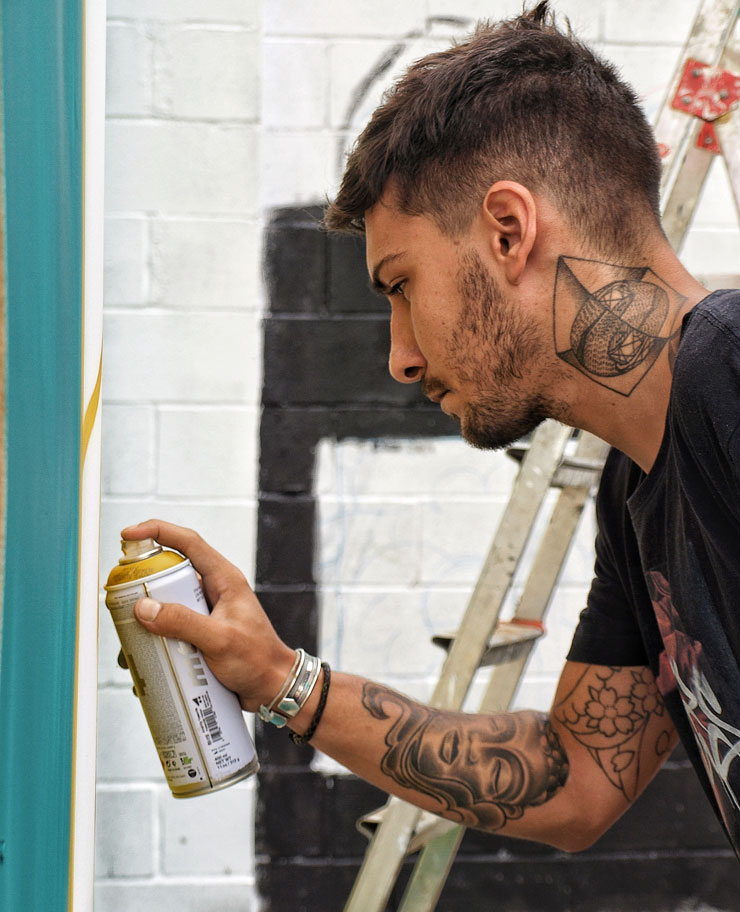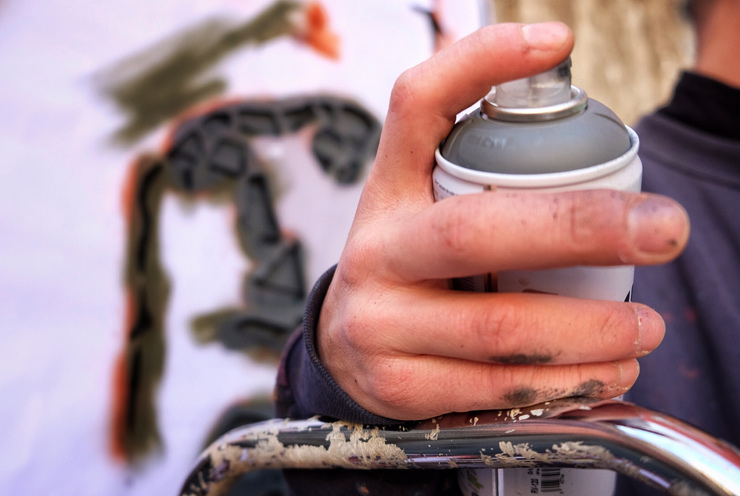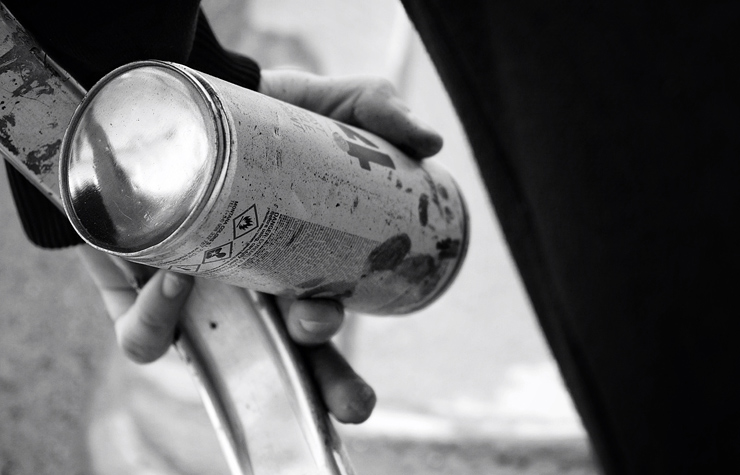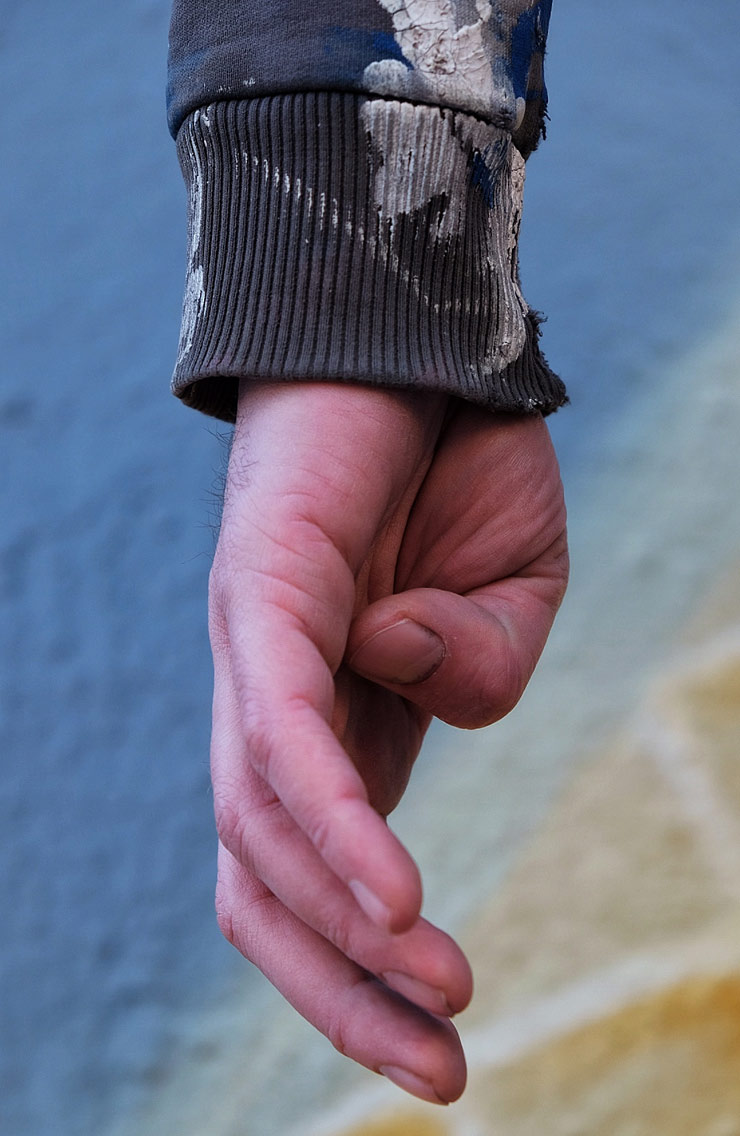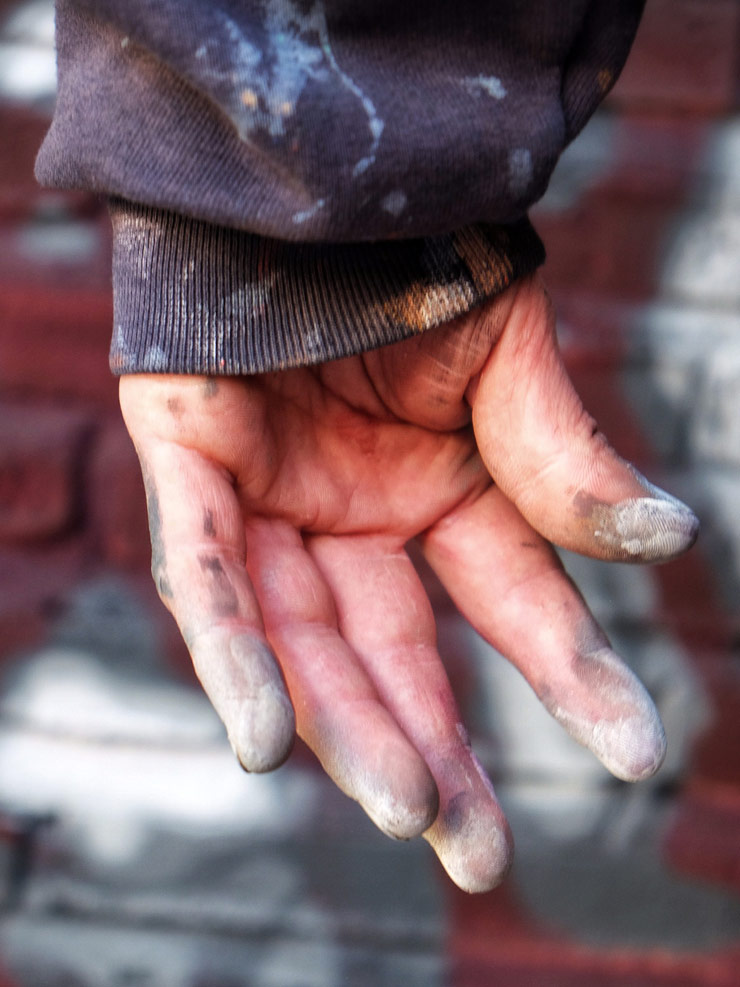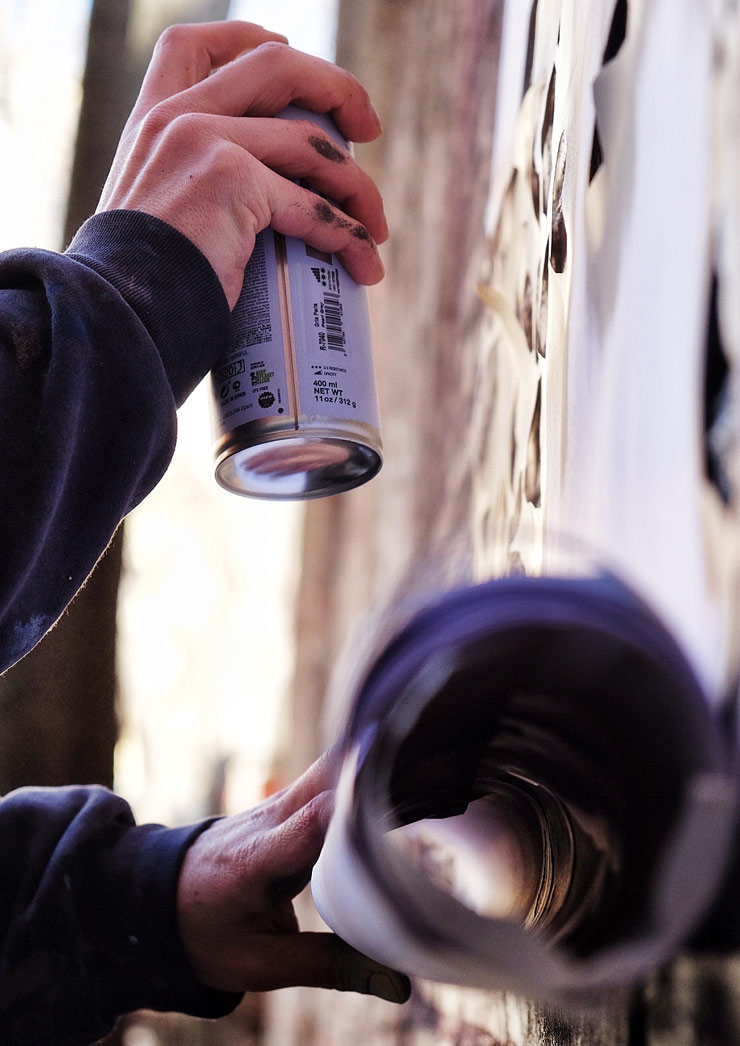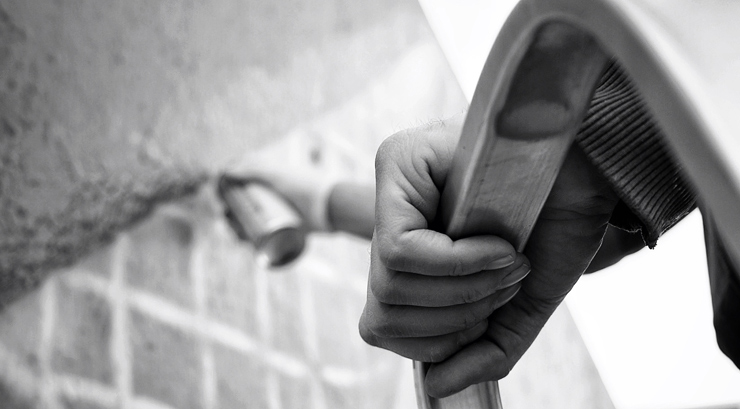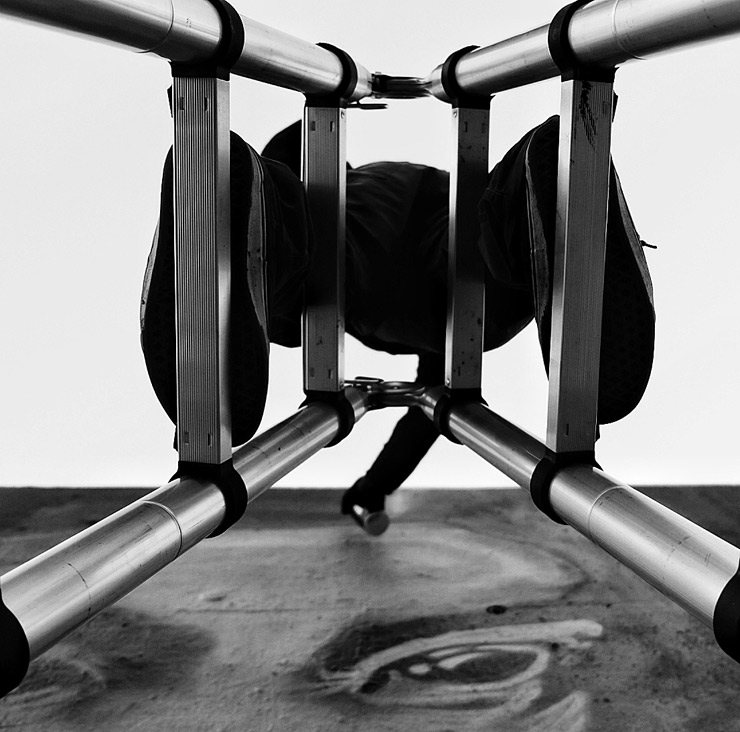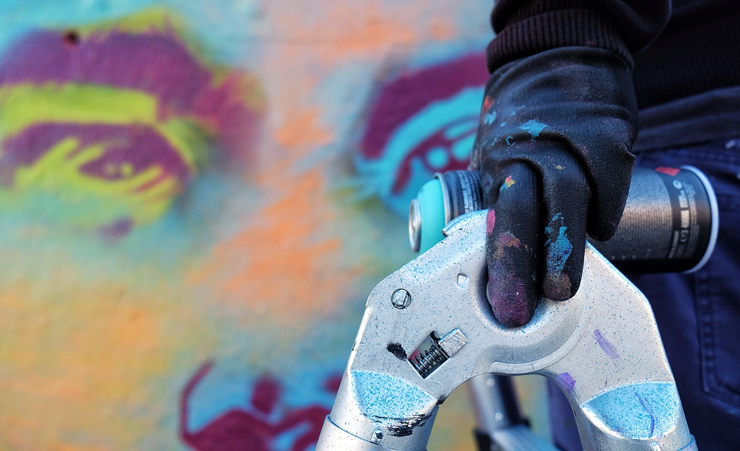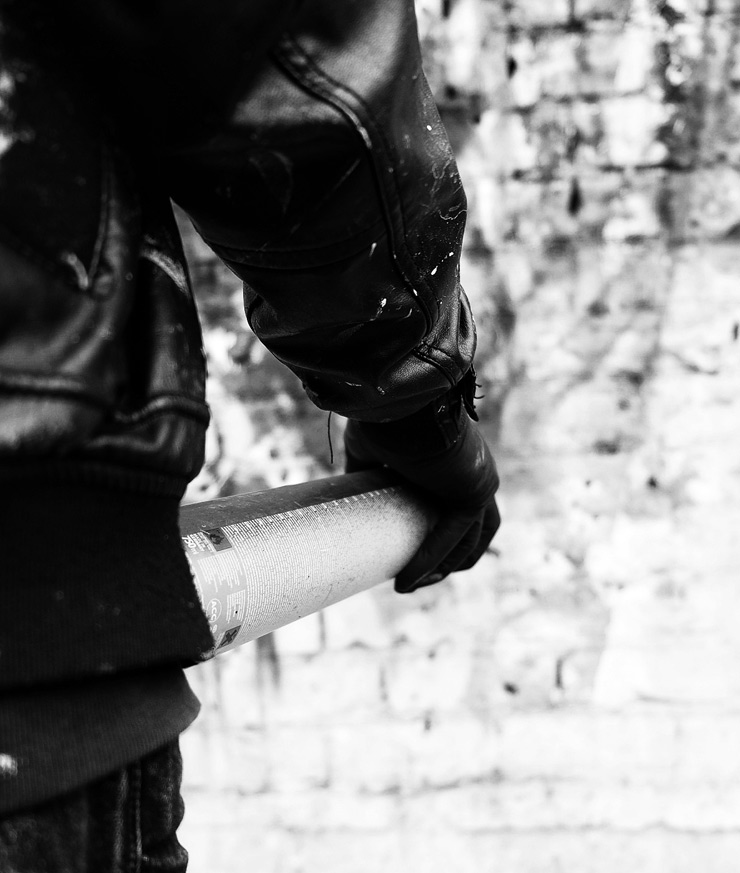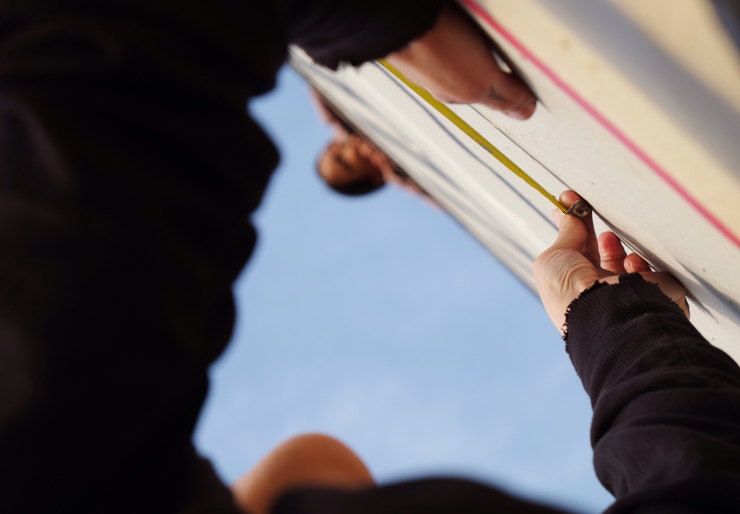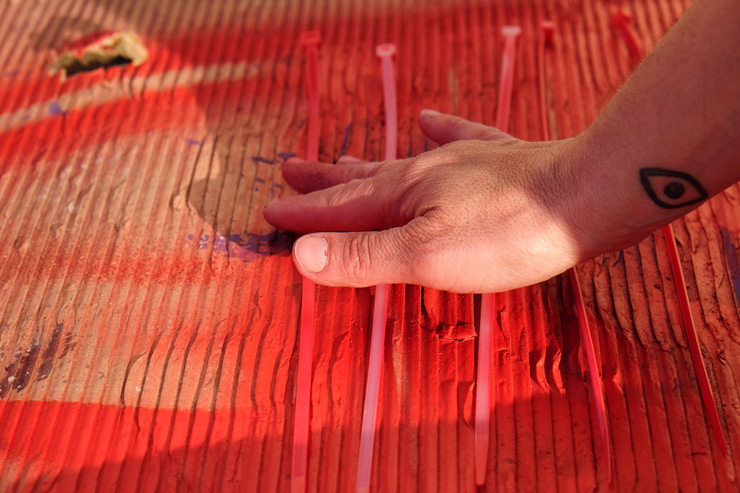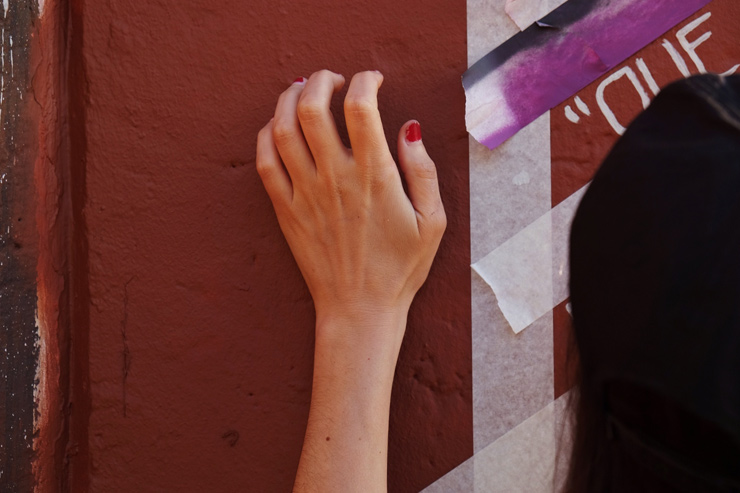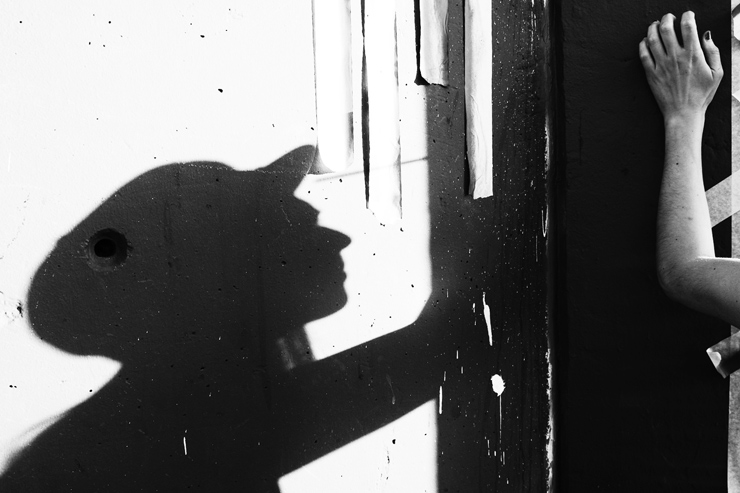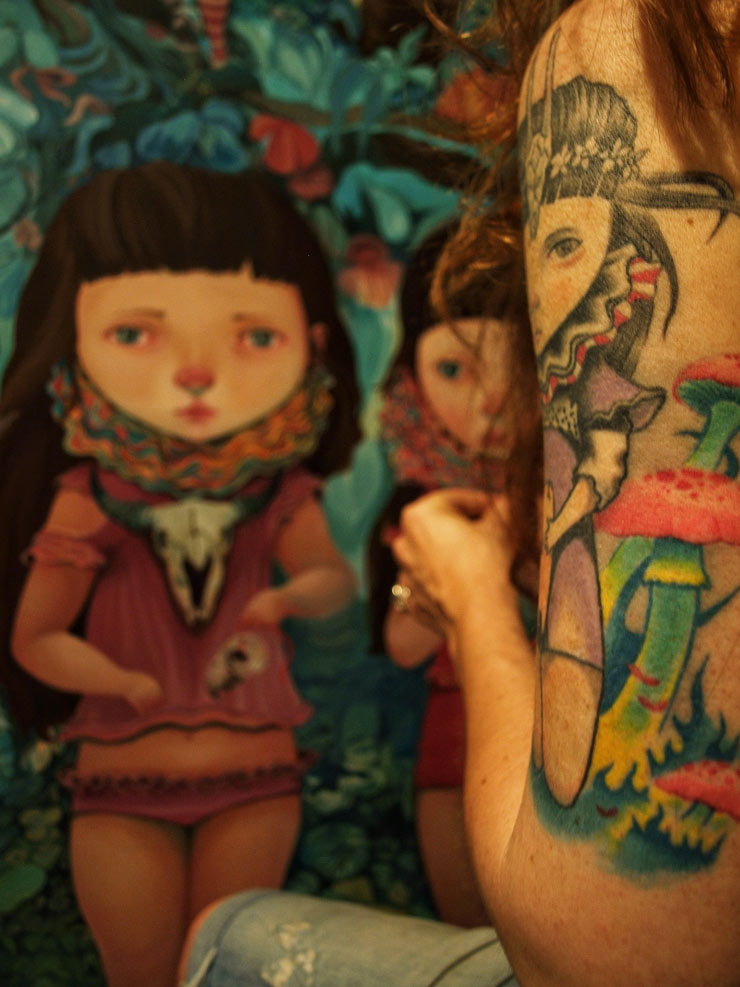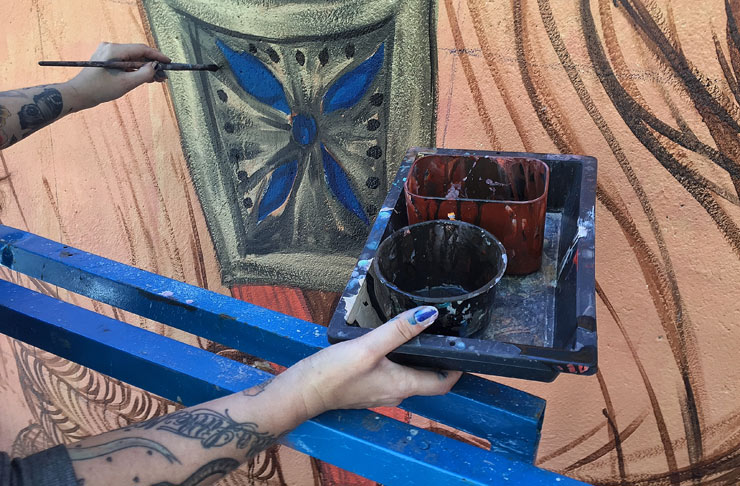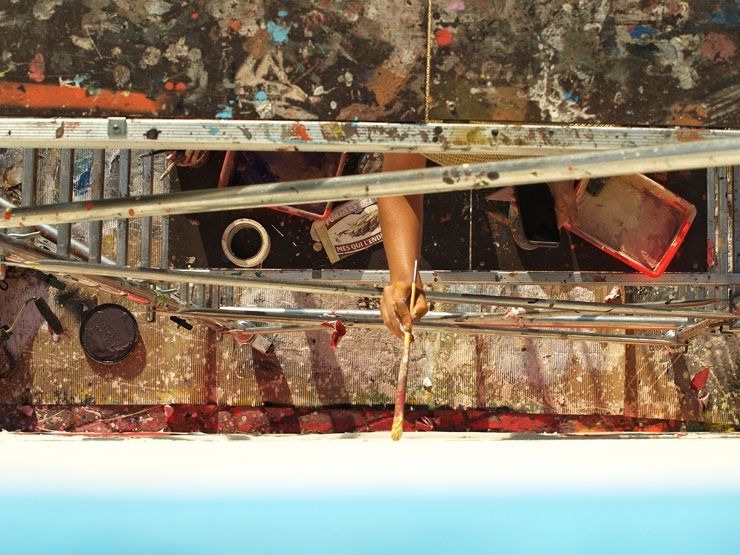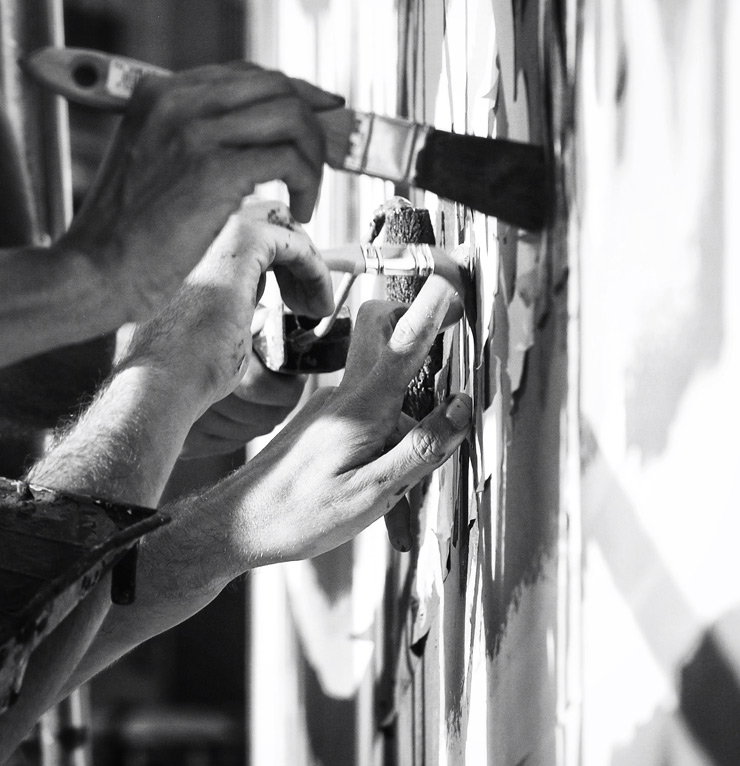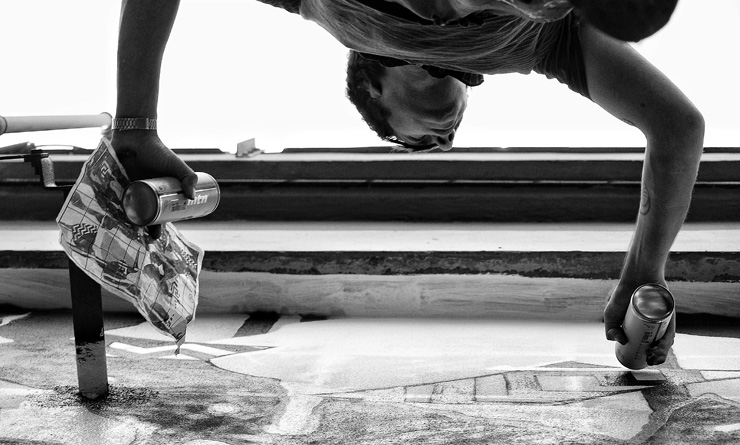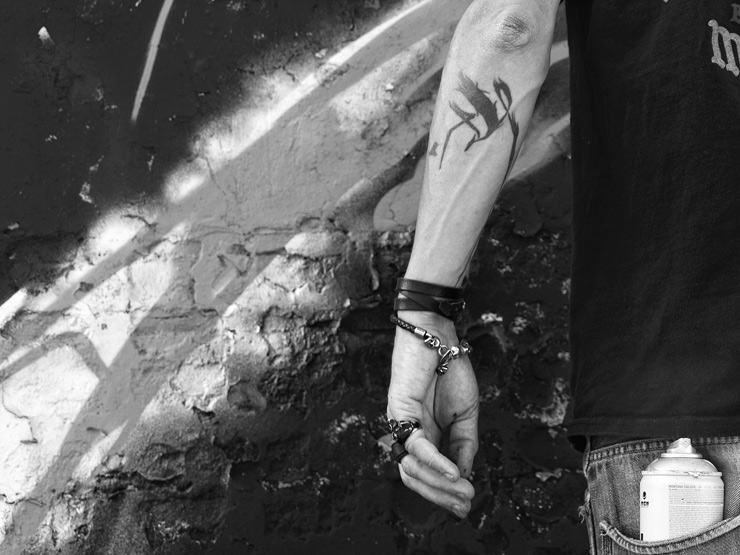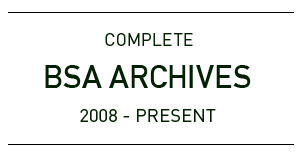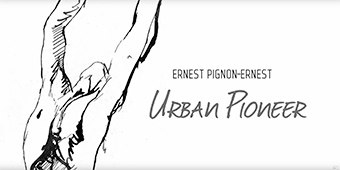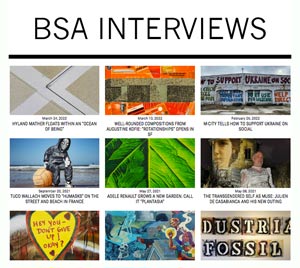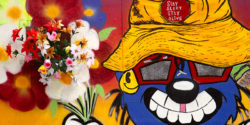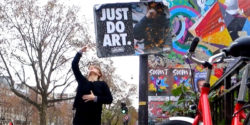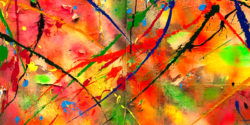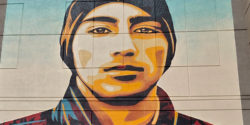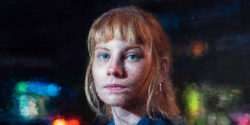“Today there are nearly 80 works – paintings and installations,” says Alban Morlot, “to discover in the inner city and its periphery.”
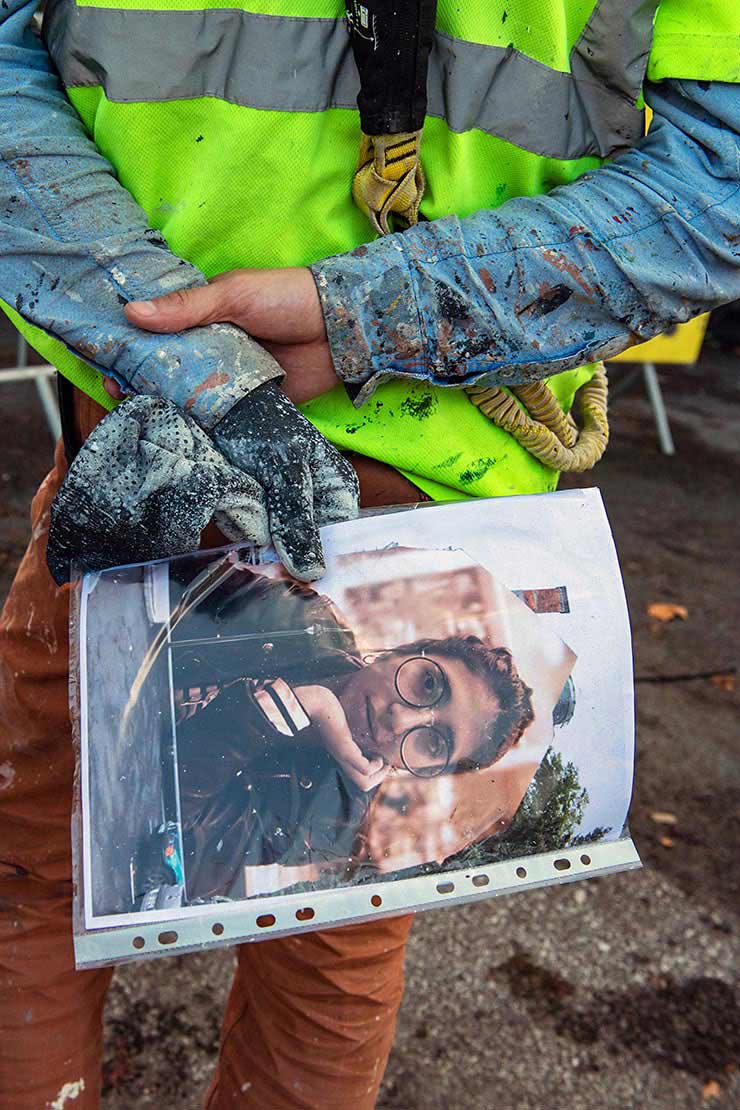
Mantra. Points De Vue Festival 2018. Bayonne, France. (photo © Martha Cooper)
The founder and curator of Points de Vue is speaking about his city, Bayonne in the south of France, which straddles the Basque region and boasts the language throughout this region and neighboring Spain. Here on both sides of the the Adour river running through the small city, you will find new installations from this years invited 20 or so artists from the urban art scene including folks like the Portuguese Pantonio, Italian Pixel Pancho, French Mantra, French Koralie, Venezuelan Koz Dox, German 1UP Crew, and the American graffiti and Street Art documentarian Martha Cooper.
Spawned a few years ago from Morlot and his team at Spacejunk, the community/privately funded festival has produced a range of large public works throughout the city. Similarly, the storefront Spacejunk space on rue Sainte Catherine in the Saint-Esprit district of Bayonne had hosted a cultural and artistic association that spans genres and disciplines; hosting classes, talks, performances and exhibitions of modern artists drawn from the worlds of of Street Art, LowBrow, and Pop Surrealism. After a great number of group and solo shows Spacejunk is now entering their 11 year celebrating counter-culture.
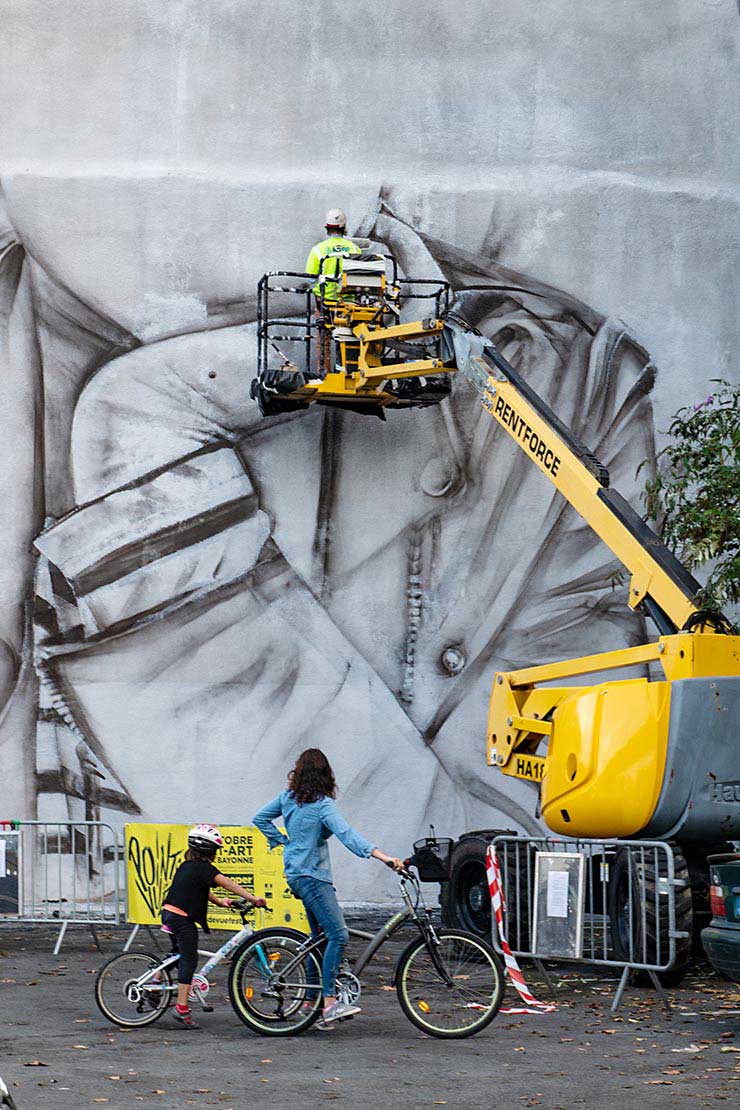
Mantra. Points De Vue Festival 2018. Bayonne, France. (photo © Martha Cooper)
Bayonne is stitched together geographically and socially with nearby Biarritz and Anglet, so the Basque area of about 130,000 has enough fans and practioners to support this five day festival. Alban tells us that the usual staff of 3 who run Spacejunk couldn’t do the festival without the generous enthusiasm and efforts of 40 volunteers, 10 interns and 1 senior technician.
An eclectic mix of artists invited to create new works in the public space reflect the alternative environments that have been showcased at Spacejunk: influences from a number of subcultural narratives including comics, punk, tattoo, skater culture, graffiti, and of course, Street Art.
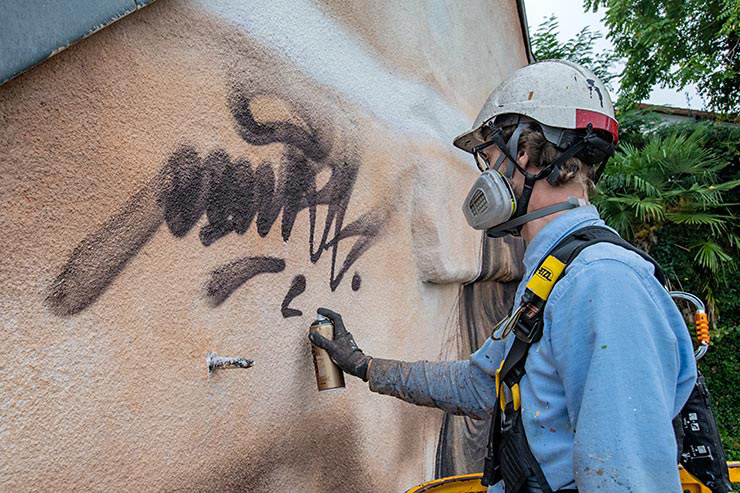
Mantra. Points De Vue Festival 2018. Bayonne, France. (photo © Martha Cooper)
With very special thanks to Ms. Cooper and Ms. Kramer we have today new images to share with BSA readers from this autumns’ edition of Points de Vue. We also had an opportunity to speak with Mr. Morlot about his approach to the festival.
BSA: How did you conceive of Points de Vue?
Alban Morlot: I have work for Spacejunk art center for almost 15 years and have run the art center of Bayonne – Basque Country – since 2007. During this time I’ve met many artists from all over the world who have work in public space previously. At that time, French public authorities were under-informed about street art mutations so it was difficult to organize outside projects with street artists – who many people automatically associated to vandalism.
I was frustrated at not being able to take advantage of their presence and their talent to develop their aesthetics in situ. It was during that time that the idea of a festival sprouted in my mind – but it was only later that the planets were aligned!
Equipped with years of experiences, I wanted to set up an event that could represent the variety of the creative styles being used in public space and to provide an educational approach in the same time. The underlying idea is to show the multiplicity of artistic points of view, to confront them, and to offer to the wider audience the opportunity to enrich themselves with others’ eyes.
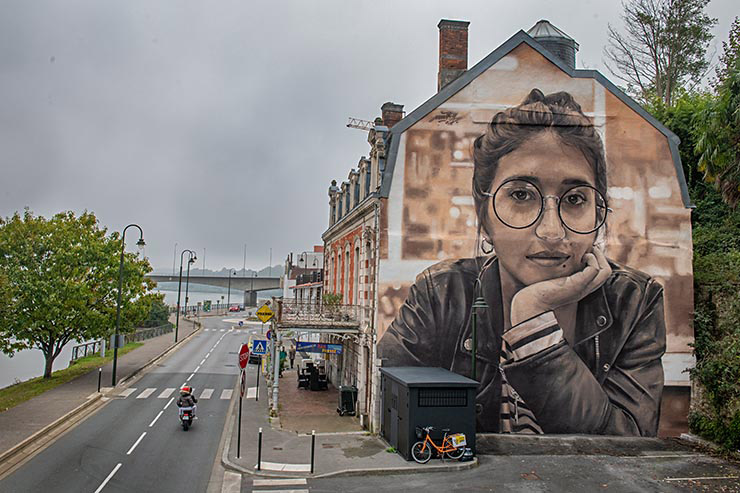
Mantra. Points De Vue Festival 2018. Bayonne, France. (photo © Martha Cooper)
BSA: What’s your criteria as an organizer when inviting the artists to participate?
Alban Morlot: First, I make sure that the artistic selection is consistent with the purpose of the festival: to discover the extent of the current creations happening in public space. Then it’s the walls that guide me in my research. The context, the format, the situation… are all criteria that I integrate before launching a personalized invitation to an artist.
Most of the time, I invite artists whom I have already met because I like building relationships that go beyond the “one shot”. I know that it could be possible to pass up several editions before I can propose an invitation to such and such artist, but I prefer to wait the right moment, try to gather the best conditions and do a serious proposal so that from the artworks there emerges the pleasure of painting.
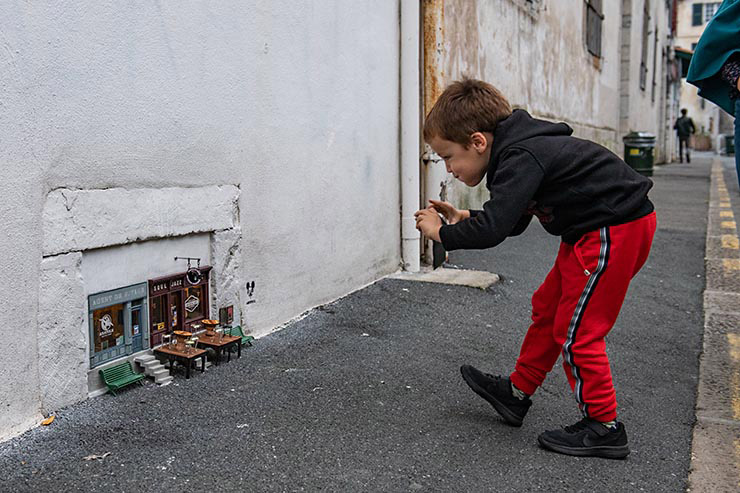
Anonymouse. Points De Vue Festival 2018. Bayonne, France. (photo © Martha Cooper)
Then I try to build a singular identity for the festival “Points of View”. The Basque Country is located between France and Spain. It is important in this context to boost cross-border artistic exchanges between the northern Basque Country (Iparralde) and the south (Hegoalde).
Last but not least, I try to encourage the presence of female artists because they remain largely underrepresented in this artistic scene.
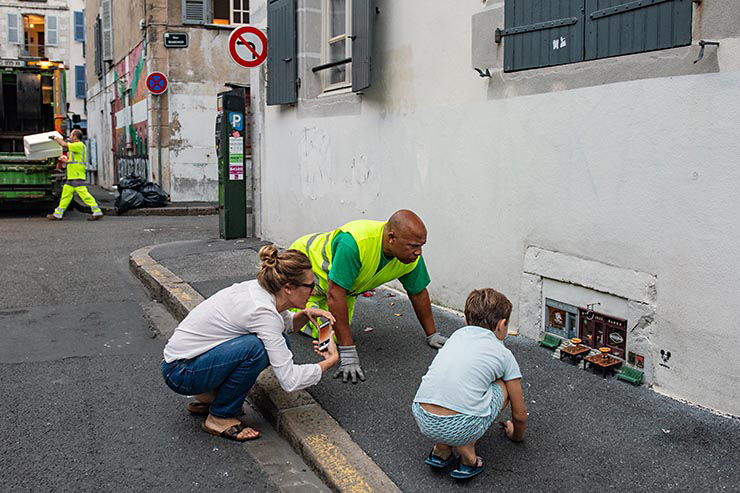
Anonymouse. Points De Vue Festival 2018. Bayonne, France. (photo © Martha Cooper)
BSA: Bayonne is also known for its political murals. Do you encourage the artists to be political with their work as well?
Alban Morlot: Generally, I do not allow myself to intervene in the process of artistic creation. I give my opinion if necessary but for me, once the selection is complete, I trust them. I want to allow everyone to practice his or her job with good conditions and it can happen if each part knows his appropriate place.
That said, I do not hesitate to convey the history of the region that welcomes them, because here as elsewhere, there is a story, a people and a language. It is political in a sense, but in the noble meaning!
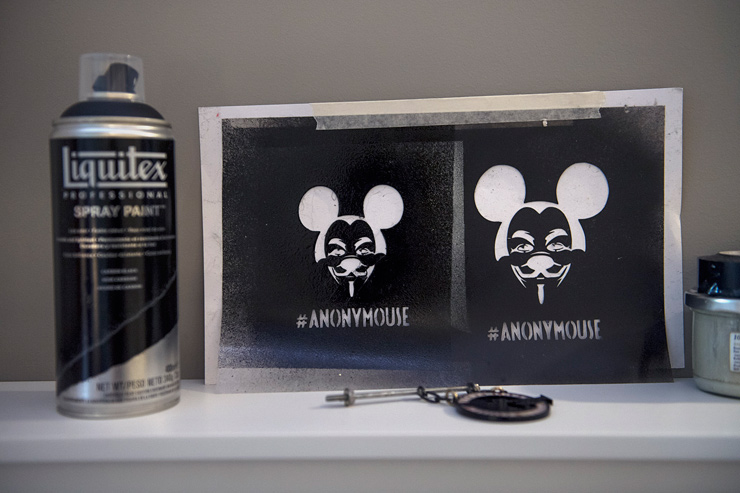
Anonymouse. Points De Vue Festival 2018. Bayonne, France. (photo © Nika Kramer)
BSA: Do you see Points de Vue purely as a beautification of the city or do you see it to make a social impact within the community?
Alban Morlot: In no way should our action be seen as decoration. Otherwise, I would not give carte blanche to the artists. No, I undertake a cultural project that aims to promote the meeting between artists and the public, generates exchanges, curiosity, in order to support everyone to be emancipated as a citizen.
Of course, I am not unaware of the social, economic, touristic considerations nor the impact of the festival on urban renewal programs. Culture is transversal and this is its strength, but I do not want to be polluted by other considerations that could divert me from the basics of the festival. I want to give artists the opportunity to work on a wall as they would in their studios and give them the opportunity to meet each other.
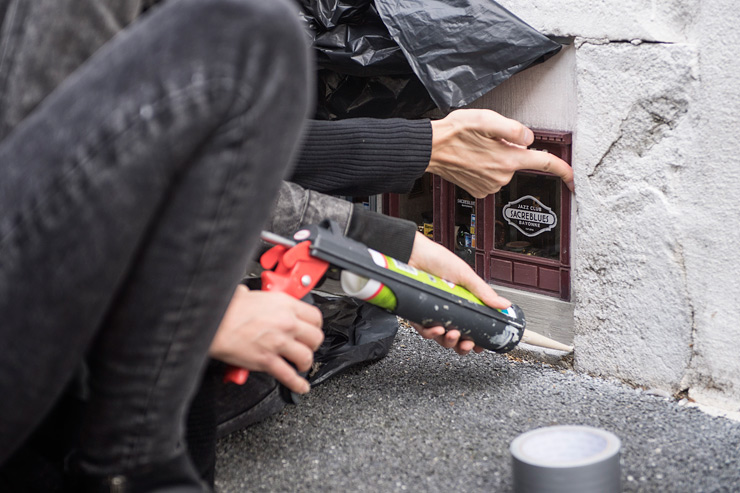
Anonymouse. Points De Vue Festival 2018. Bayonne, France. (photo © Nika Kramer)
BSA: How do you see the arts in public space making a difference to society? Should that be the mission or art in public space?
Alban Morlot: Art in the private space or in the public space plays the same role. The unprecedented recognition of urban art is one of all manifestations of social upheaval that we go through in modern societies. I think there’s a break with previous artistic movements because it more closely allies with the aspirations of today’s people – with think tanks who want to reinvest public spaces, etcetera. Art has always been an indicator of the evolution of society.
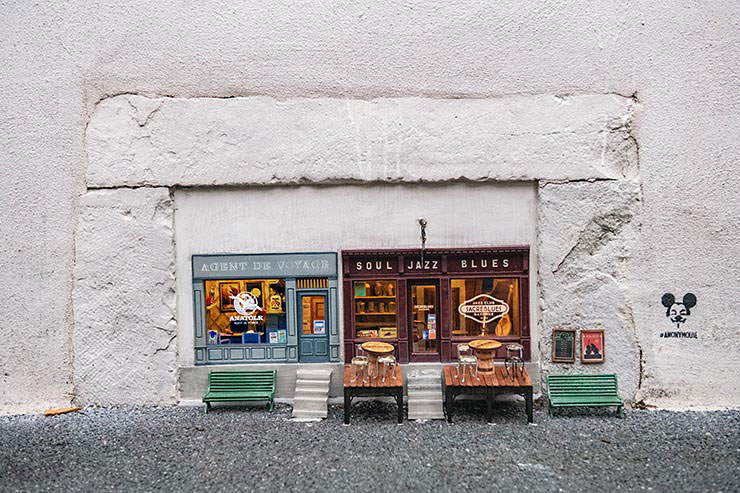
Anonymouse. Points De Vue Festival 2018. Bayonne, France. (photo © Martha Cooper)
BSA: What sort of support do you get from the city’s government for the implementation of the festival?
Alban Morlot: Since the Spacejunk art center is already identified by public authorities, we also receive support from these partners for the festival; This is a form of financial and logistical support. In addition, the festival is also supported by private companies and, thanks to all of these contributors, we manage to present a festival that is both qualitative and open to all.
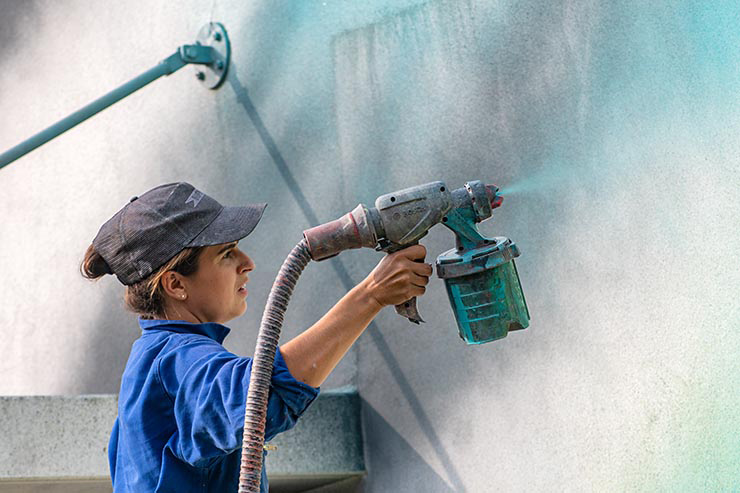
Lorcolors. Points De Vue Festival 2018. Bayonne, France. (photo © Martha Cooper)
BSA: What’s the reaction of the residents of Bayonne when they see the artists at work and the completed murals?
Alban Morlot: I must say that I was surprised by the reception that the Bayonne’s inhabitants (and vistors from nearby) have reserved for the festival. I spent almost 6 years defending this project with people who were ultimately quite afraid of the reaction of the public. But the reactions of the population were immediately enthusiastic! Martha (Cooper) even told me that it was quite unusual to see so many people on the streets coming to see the artists work. It is true that I strongly emphasized that it was a chance to see the artists in creation residencies!
Additionally, different from other events, an urban art festival leaves traces on the city which gain a certain value in time, and we are pleased that so many artists have come to the Basque country.
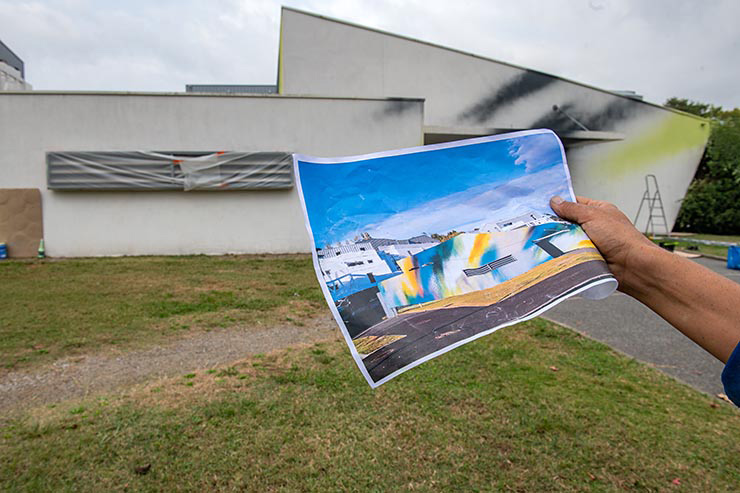
Lorcolors. Points De Vue Festival 2018. Bayonne, France. (photo © Martha Cooper)
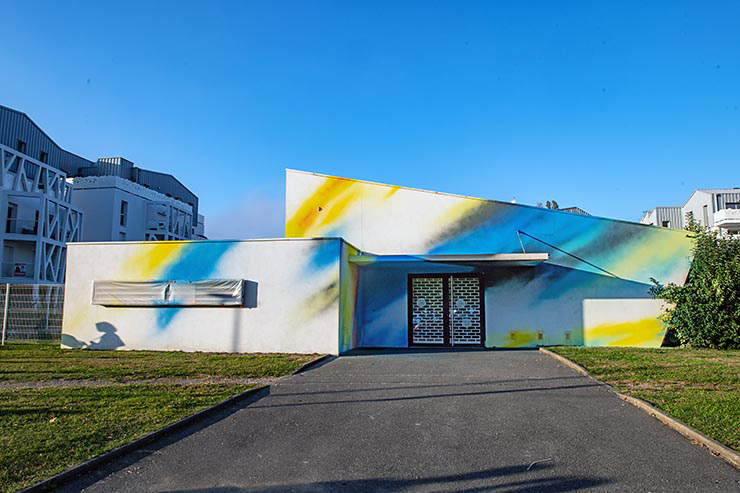
Lorcolors. Points De Vue Festival 2018. Bayonne, France. (photo © Martha Cooper)
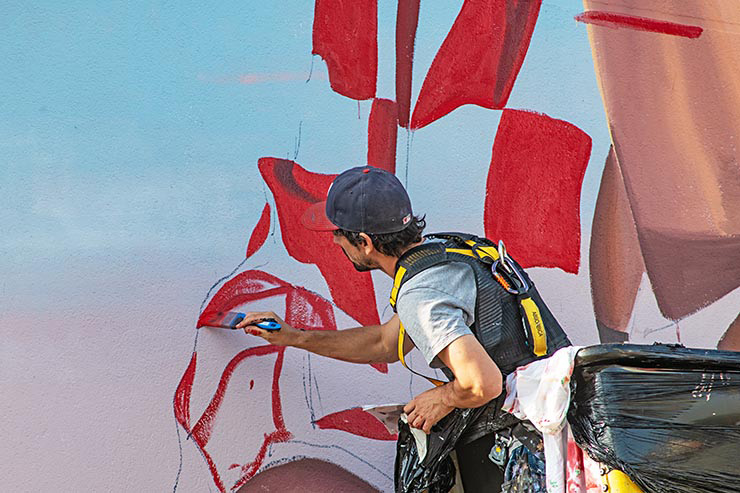
Remy Uno. Points De Vue Festival 2018. Bayonne, France. (photo © Martha Cooper)
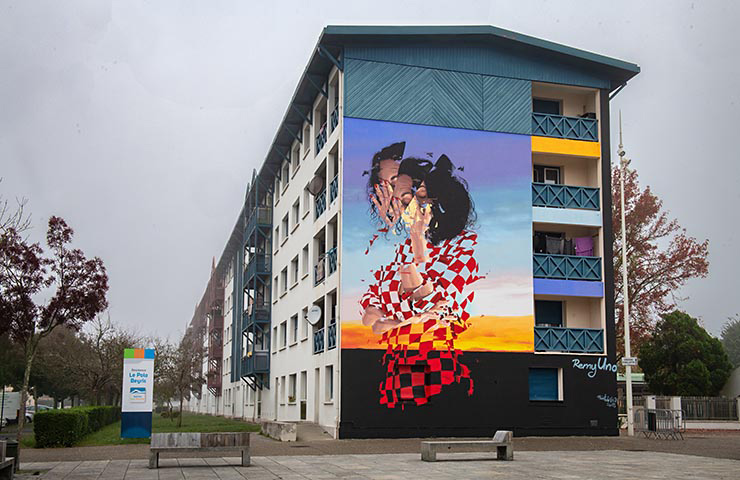
Remy Uno. Points De Vue Festival 2018. Bayonne, France. (photo © Martha Cooper)
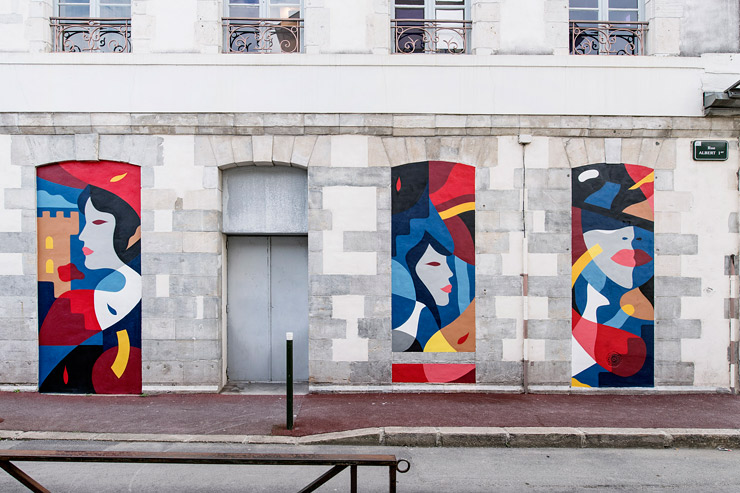
Taroe. Points De Vue Festival 2018. Bayonne, France. (photo © Nika Kramer)
![]()
Pixel Pancho. Points De Vue Festival 2018. Bayonne, France. (photo © Martha Cooper)
![]()
Pixel Pancho. Points De Vue Festival 2018. Bayonne, France. (photo © Martha Cooper)
![]()
Pixel Pancho. Points De Vue Festival 2018. Bayonne, France. (photo © Martha Cooper)
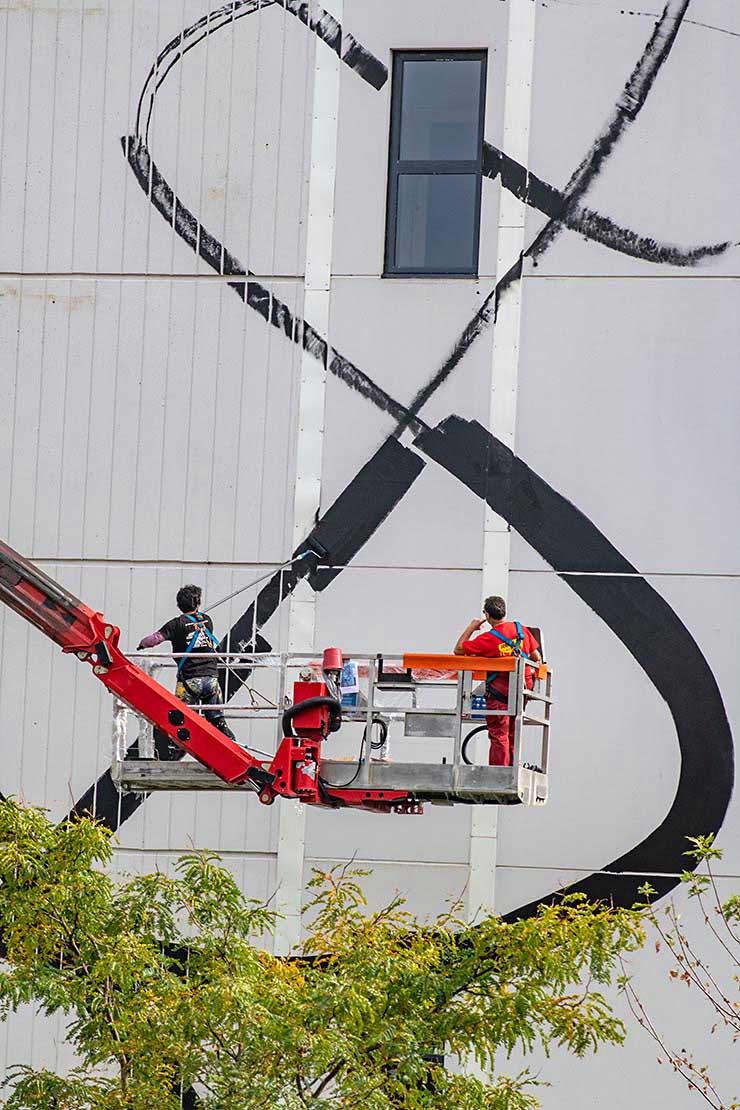
Pantonio. Points De Vue Festival 2018. Bayonne, France. (photo © Martha Cooper)
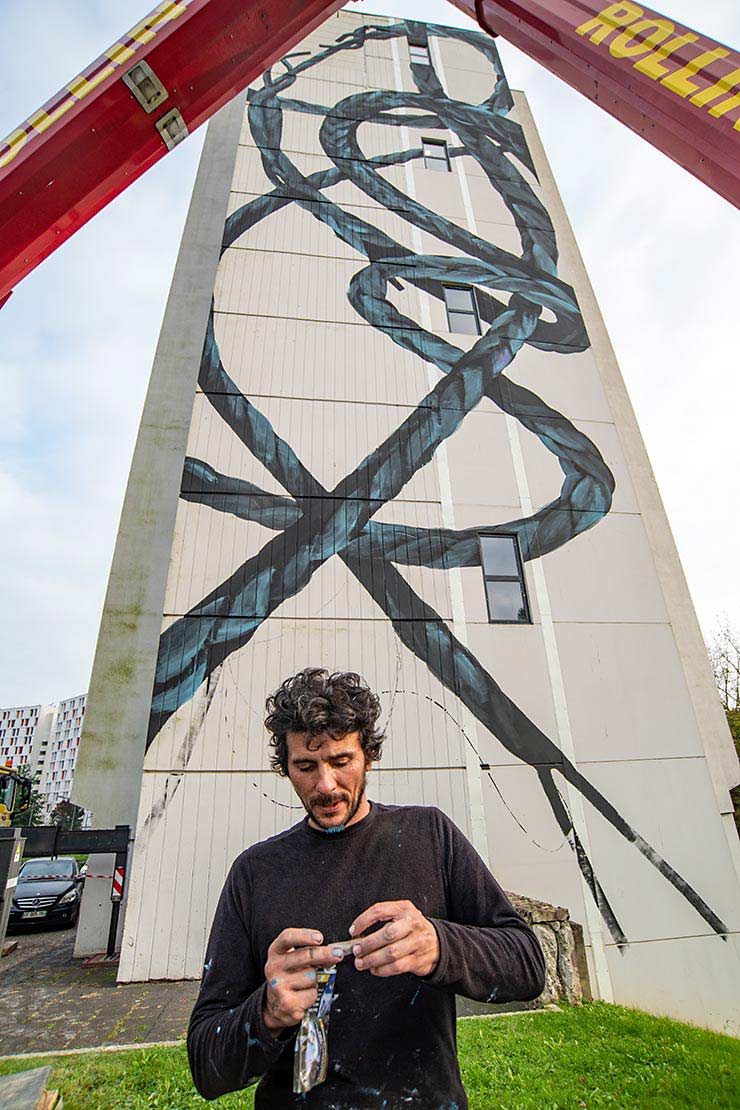
Pantonio. Points De Vue Festival 2018. Bayonne, France. (photo © Martha Cooper)
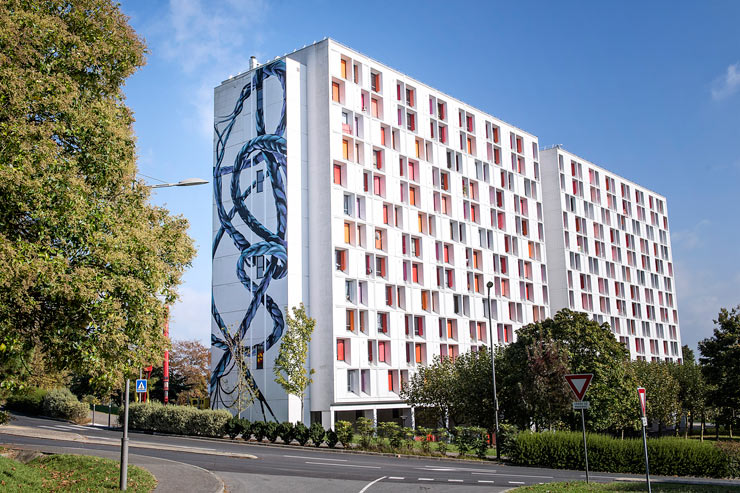
Pantonio. Points De Vue Festival 2018. Bayonne, France. (photo © Nika Kramer)
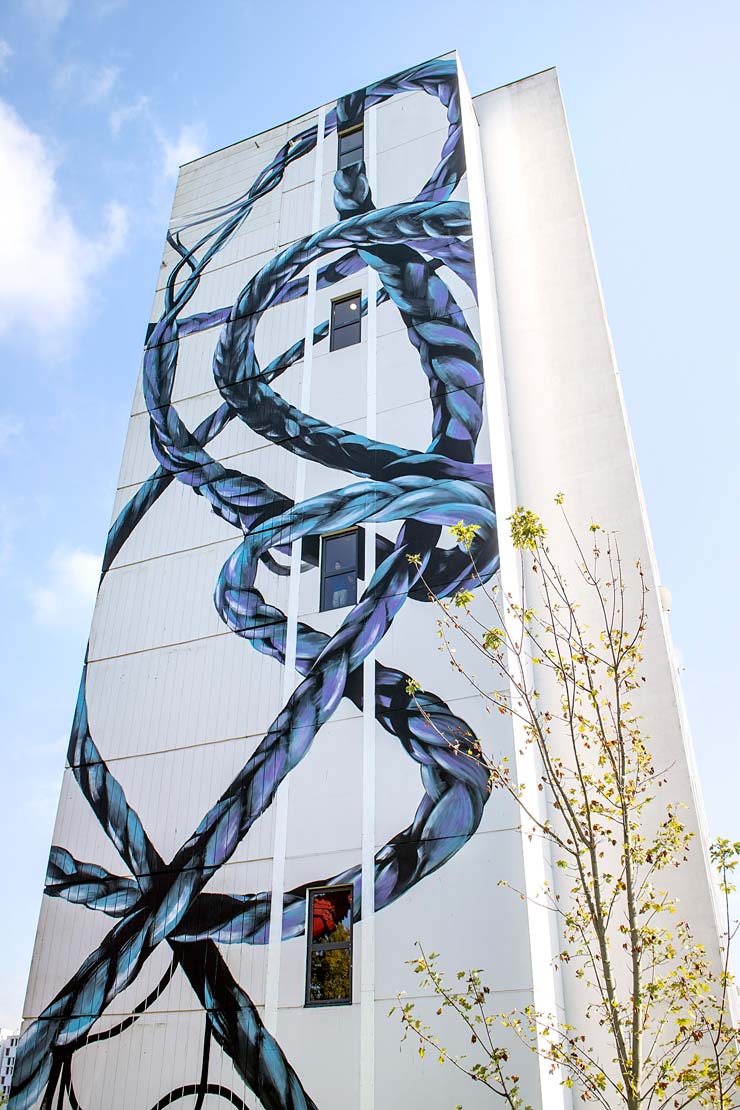
Pantonio. Points De Vue Festival 2018. Bayonne, France. (photo © Nika Kramer)
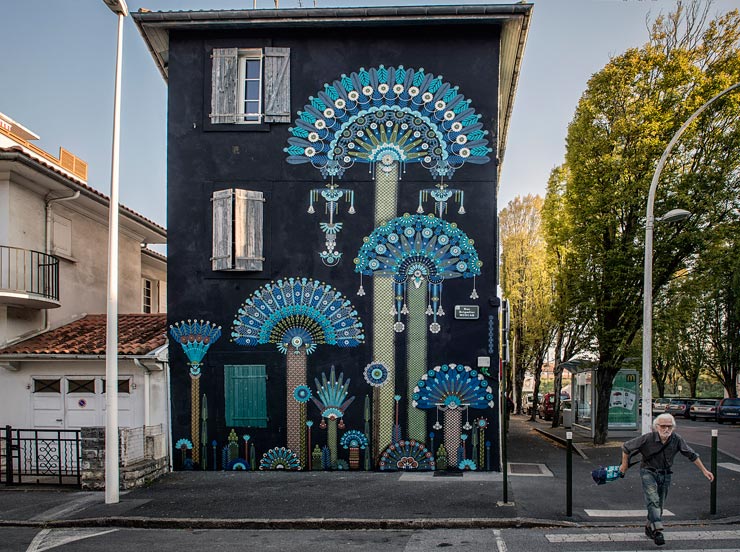
Koralie. Points De Vue Festival 2018. Bayonne, France. (photo © Nika Kramer)
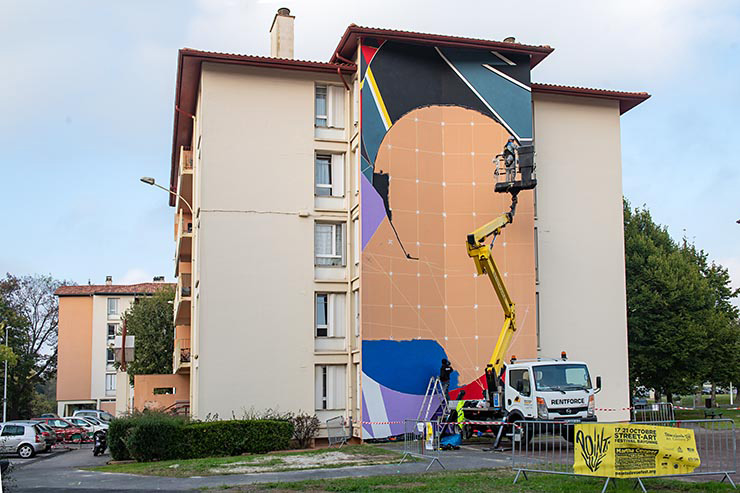
Fermin Moreno. Points De Vue Festival 2018. Bayonne, France. (photo © Martha Cooper)
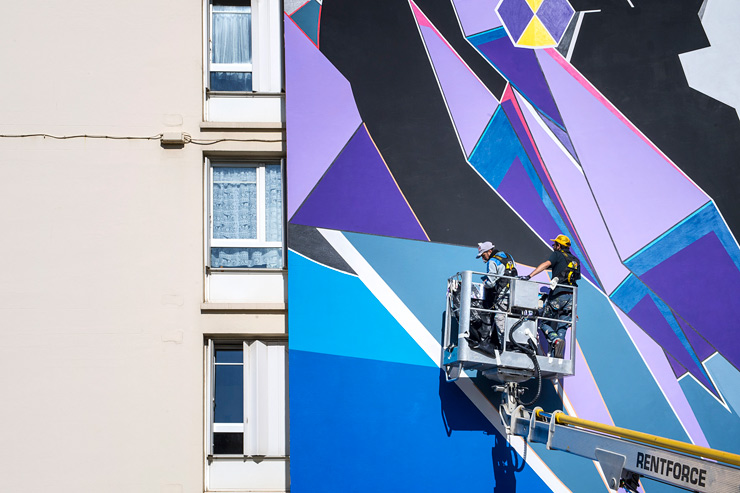
Fermin Moreno. Points De Vue Festival 2018. Bayonne, France. (photo © Nika Kramer)
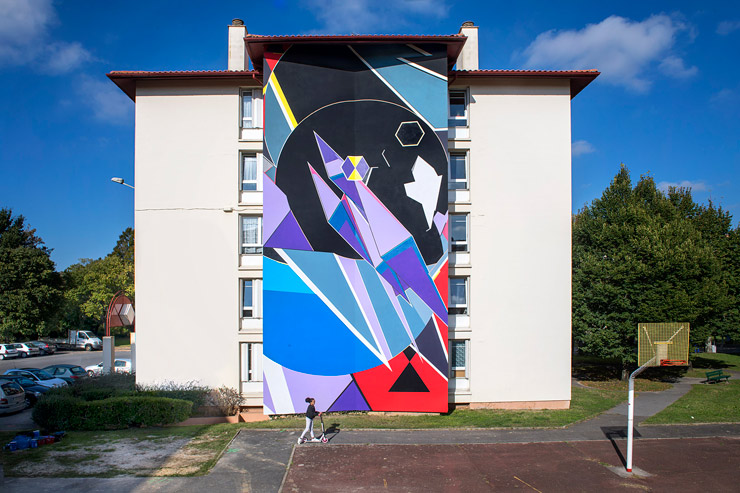
Fermin Moreno. Points De Vue Festival 2018. Bayonne, France. (photo © Nika Kramer)
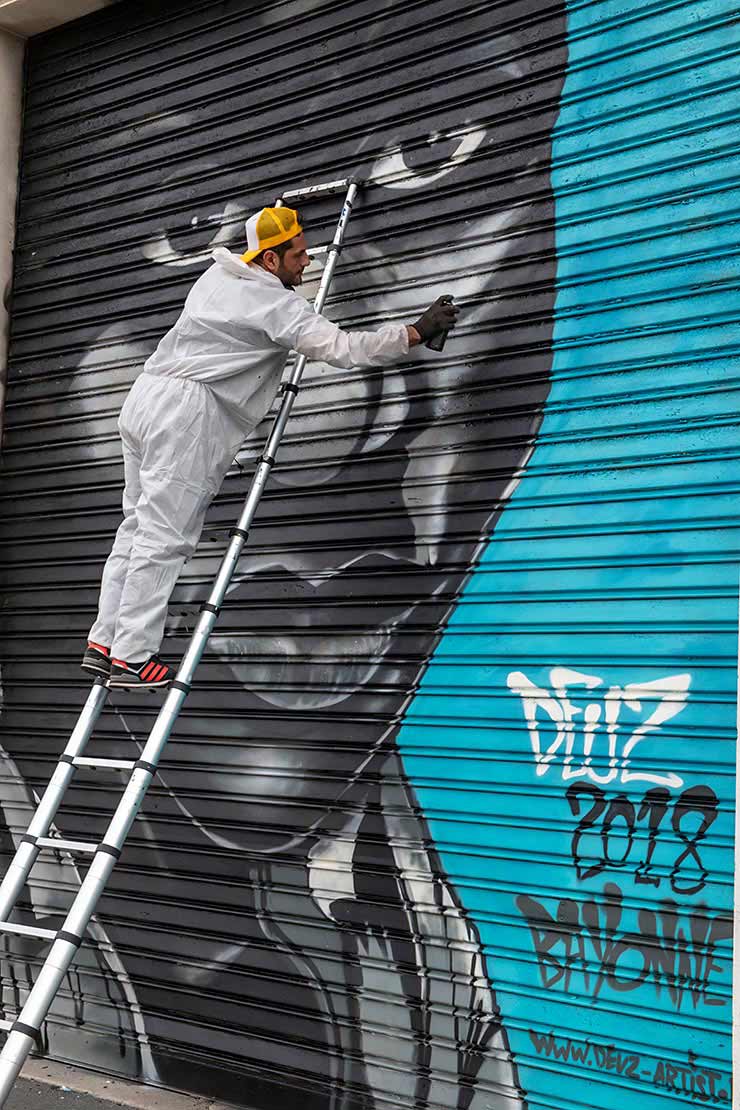
Deuz. Points De Vue Festival 2018. Bayonne, France. (photo © Martha Cooper)
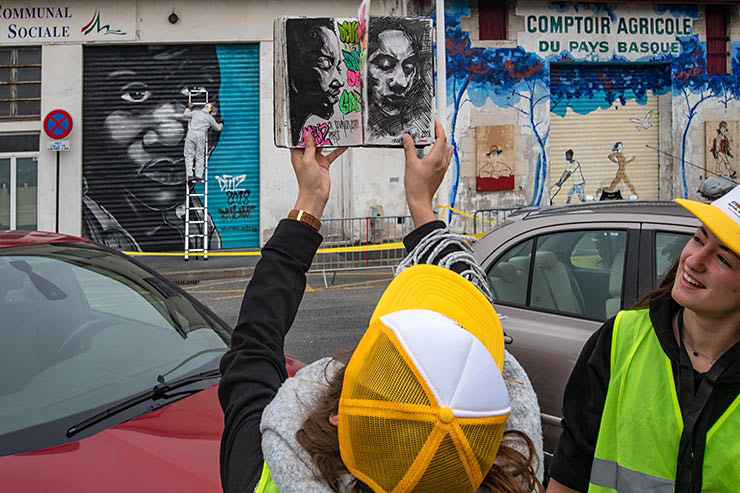
Deuz. Points De Vue Festival 2018. Bayonne, France. (photo © Martha Cooper)
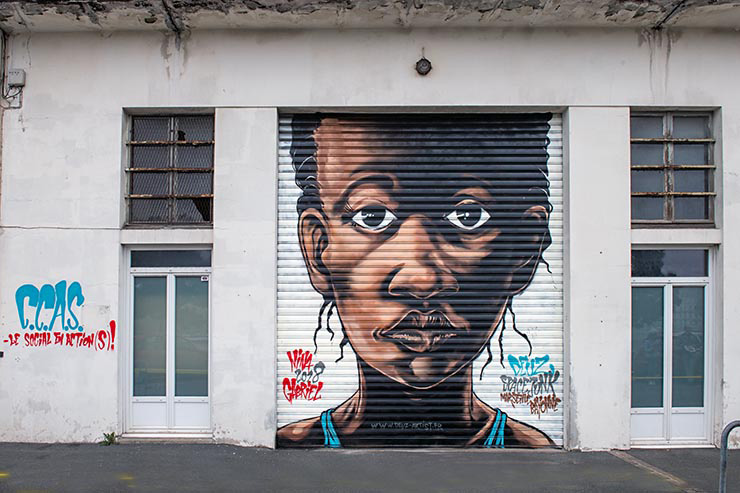
Deuz. Points De Vue Festival 2018. Bayonne, France. (photo © Martha Cooper)
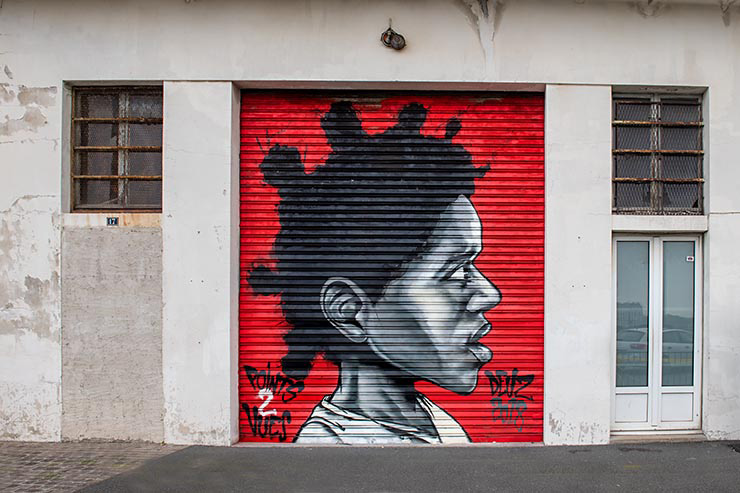
Deuz. Points De Vue Festival 2018. Bayonne, France. (photo © Martha Cooper)
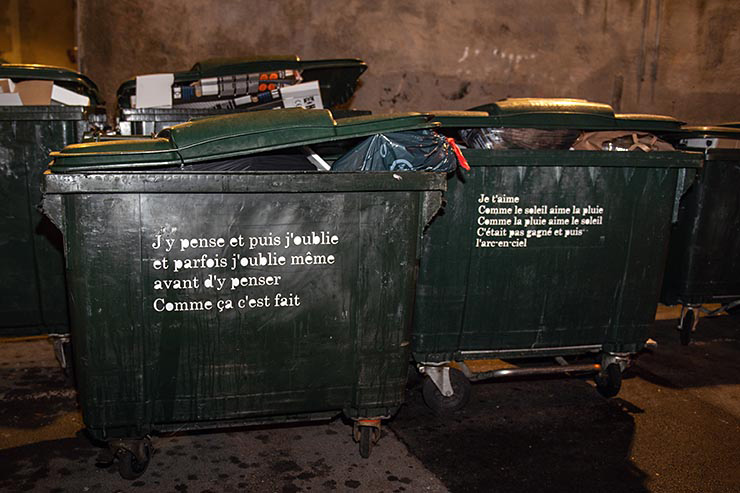
Petite Poissone. Points De Vue Festival 2018. Bayonne, France. (photo © Martha Cooper)
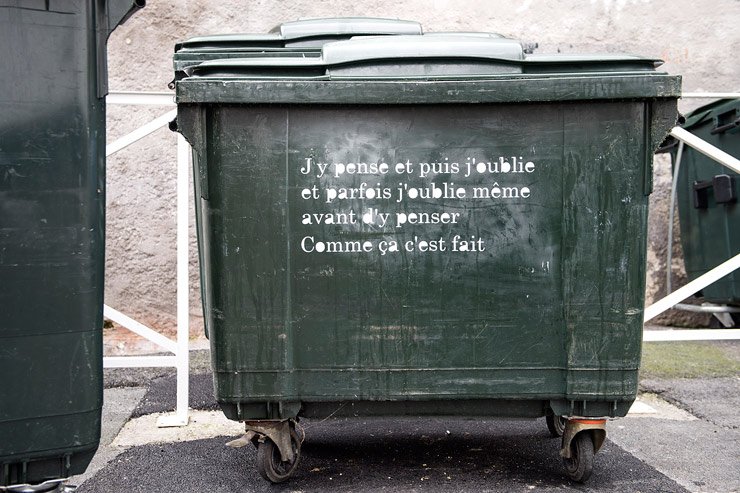
Petite Poissone. Points De Vue Festival 2018. Bayonne, France. (photo © Nika Kramer)
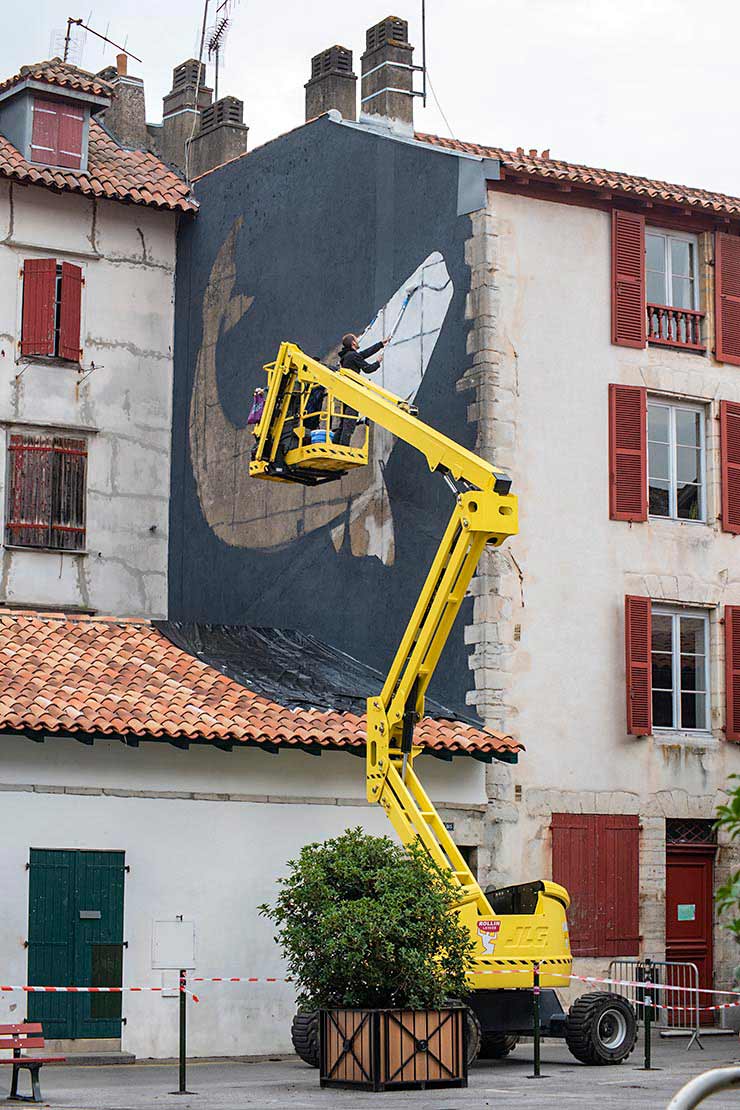
Reskate Studio. Points De Vue Festival 2018. Bayonne, France. (photo © Martha Cooper)
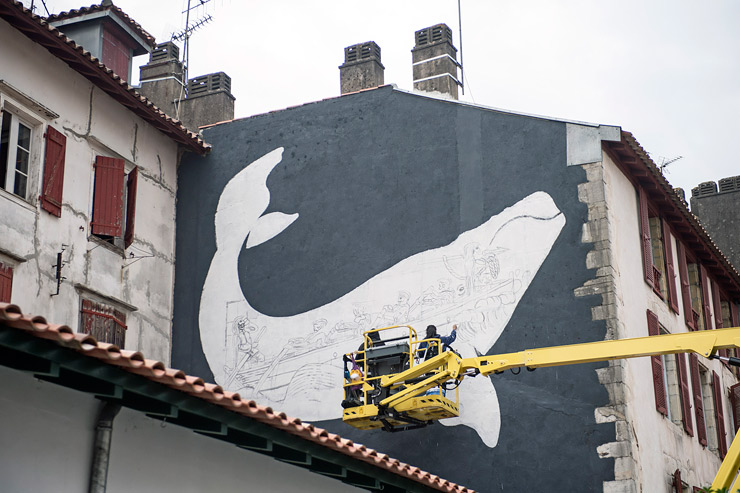
Reskate Studio. Points De Vue Festival 2018. Bayonne, France. (photo © Nika Kramer)
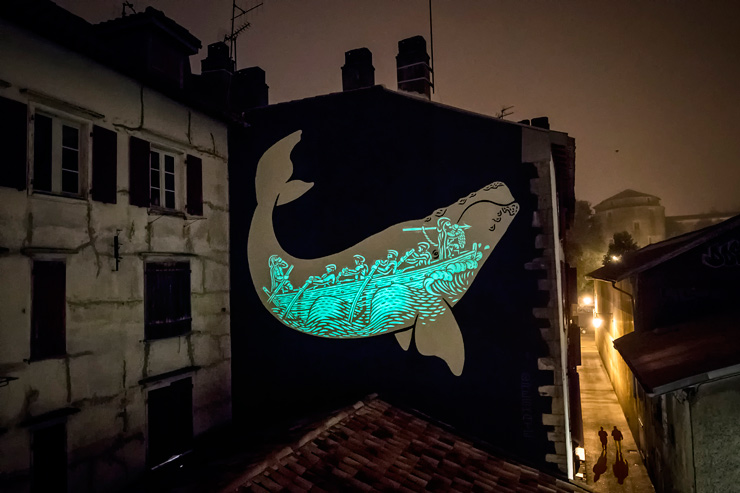
Reskate Studio. Points De Vue Festival 2018. Bayonne, France. (photo © Nika Kramer)
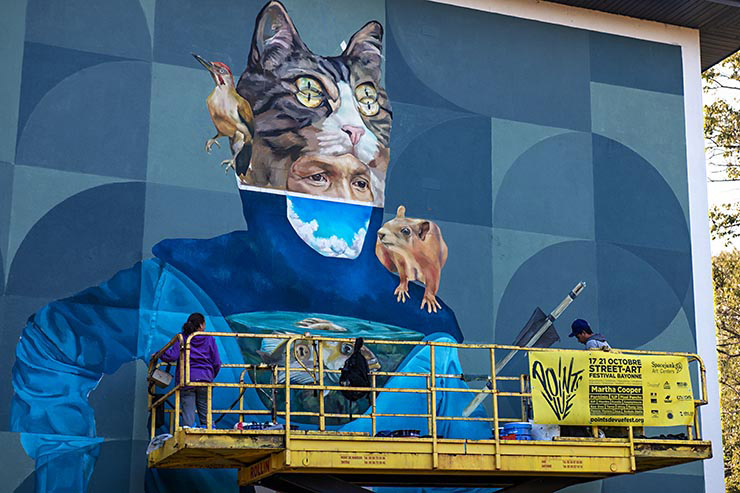
Koz Dos. Points De Vue Festival 2018. Bayonne, France. (photo © Martha Cooper)
KOZ DOS
“Punto y flecha sobre el plano”
“Dreams and the subconscious have been the genesis of my work lately. I do try not to put limits on myself or to follow a pattern when I create. The elements that are in my subconscious are the sketches to draw information from. At the same time it’s also the beginning of something that exists and that might be real and logic in our minds. It is the treatment of color, composition and form that unify all the elements and symbols, creating fantastic characters that in turn shed light to a parallel universe.
A central theme in my research for quite a while now, is the confrontation of the human versus the beast and nature. I look for harmony and coexistence through the treatment of images and the plastic arts.
In this project, titled “Punto y flecha sobre el plano” I wanted to work with the construction of the elements within the piece as something tangible, like our dreams, using lines and points on the plane or the wall in this case. Most of everything in our universe is composed of circles and lines so in this piece I wanted to give importance to the geometric form but imbued with a dreamlike quality.
When we are able to verbally communicate with each other we are able to arrive to important accords. Reaching an agreement means that we can coexist with each other. We have the tools at our disposal to do so but very often we put our focus on damaging ourselves by rejecting our origins, destroying our cultures and traditions and mowing over everything as we march on.”
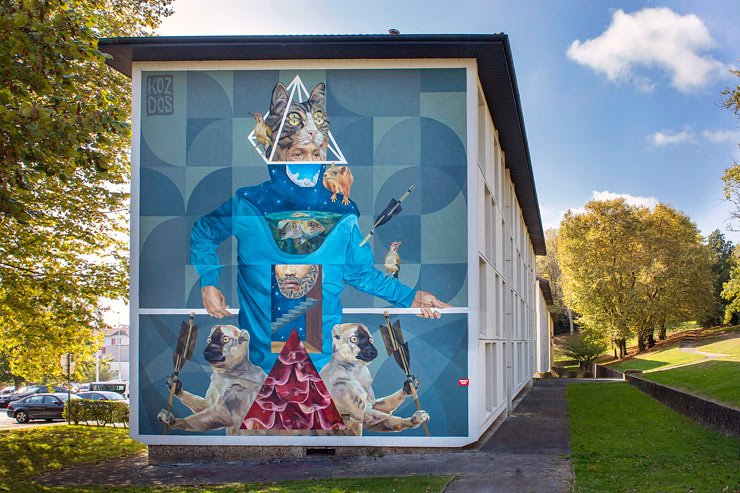
Koz Dos. Points De Vue Festival 2018. Bayonne, France. (photo © Nika Kramer)
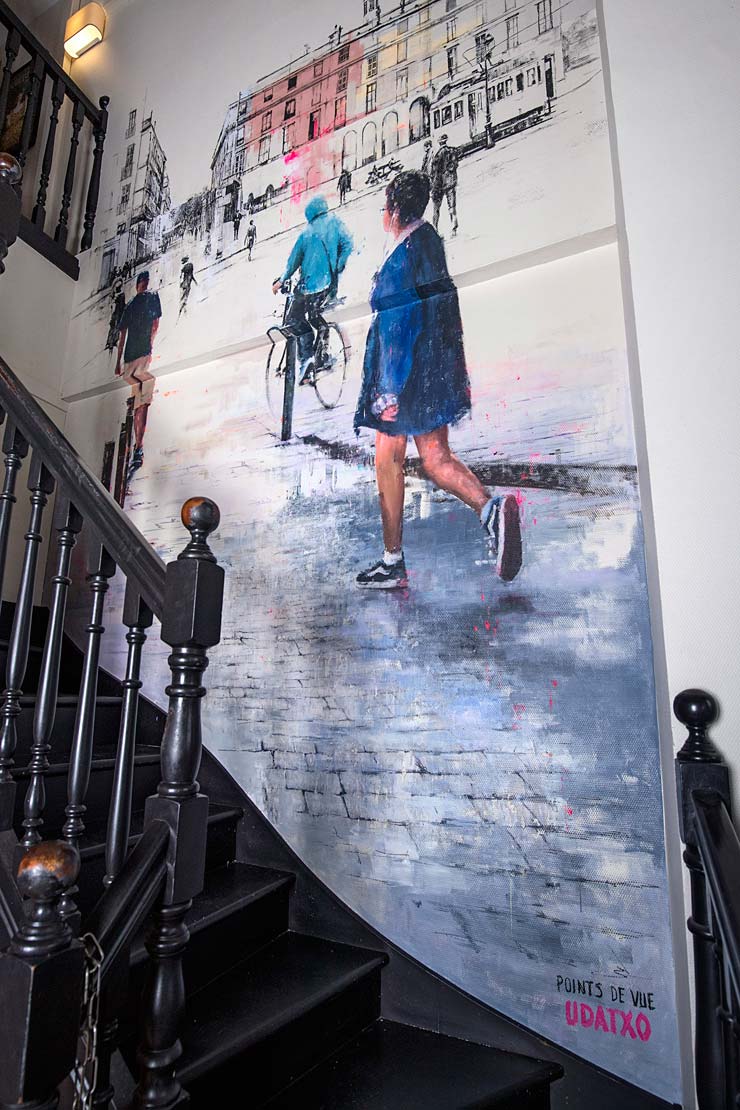
Udatxo. Points De Vue Festival 2018. Bayonne, France. (photo © Nika Kramer)
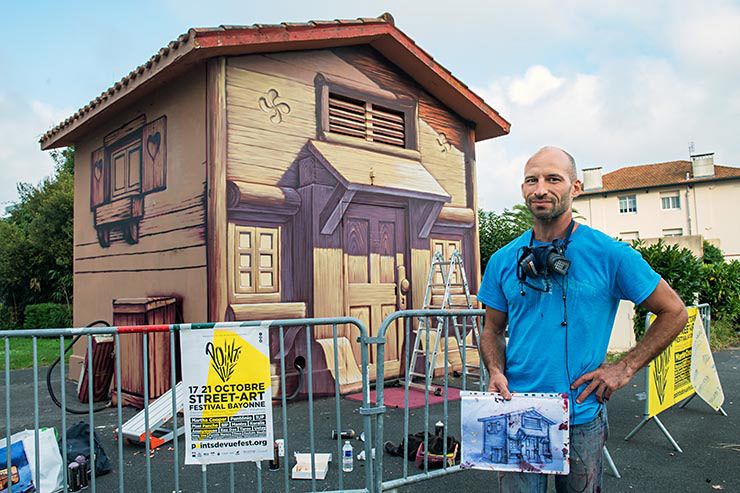
Landroid. Points De Vue Festival 2018. Bayonne, France. (photo © Martha Cooper)
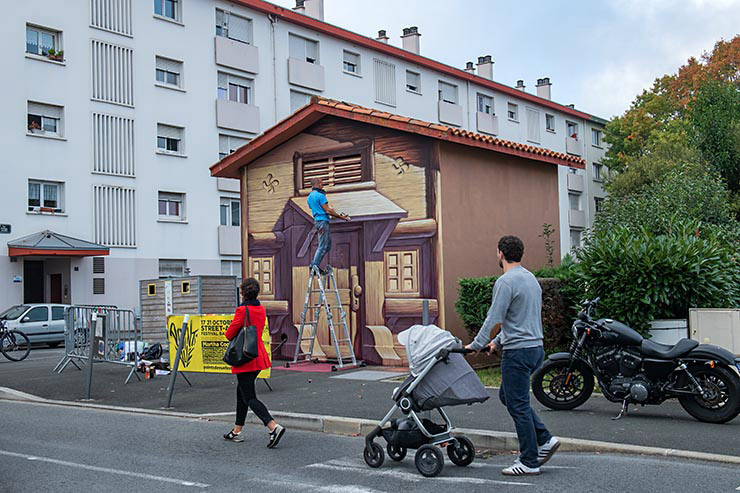
Landroid. Points De Vue Festival 2018. Bayonne, France. (photo © Martha Cooper)
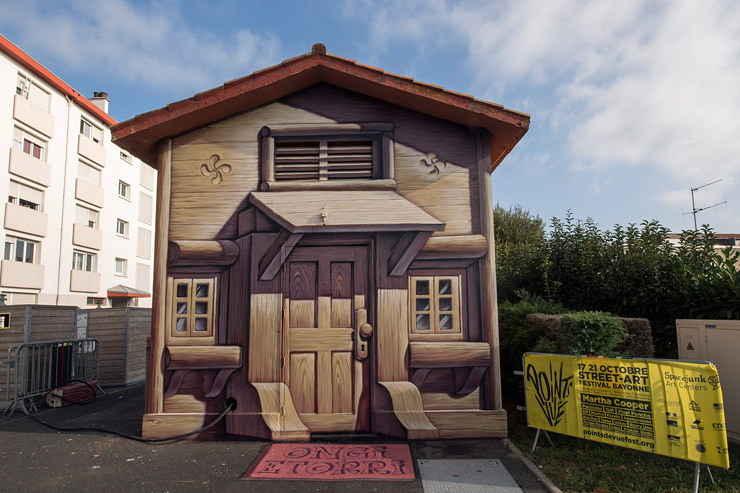
Landroid. Points De Vue Festival 2018. Bayonne, France. (photo © Nika Kramer)
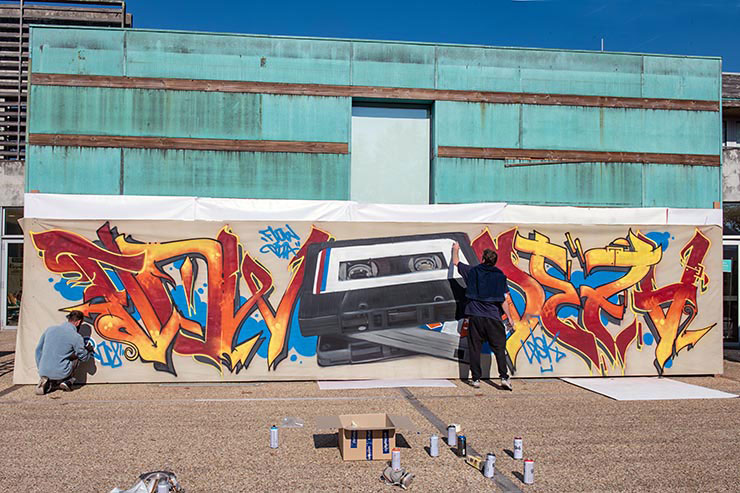
Flow . Deza. Points De Vue Festival 2018. Bayonne, France. (photo © Martha Cooper)
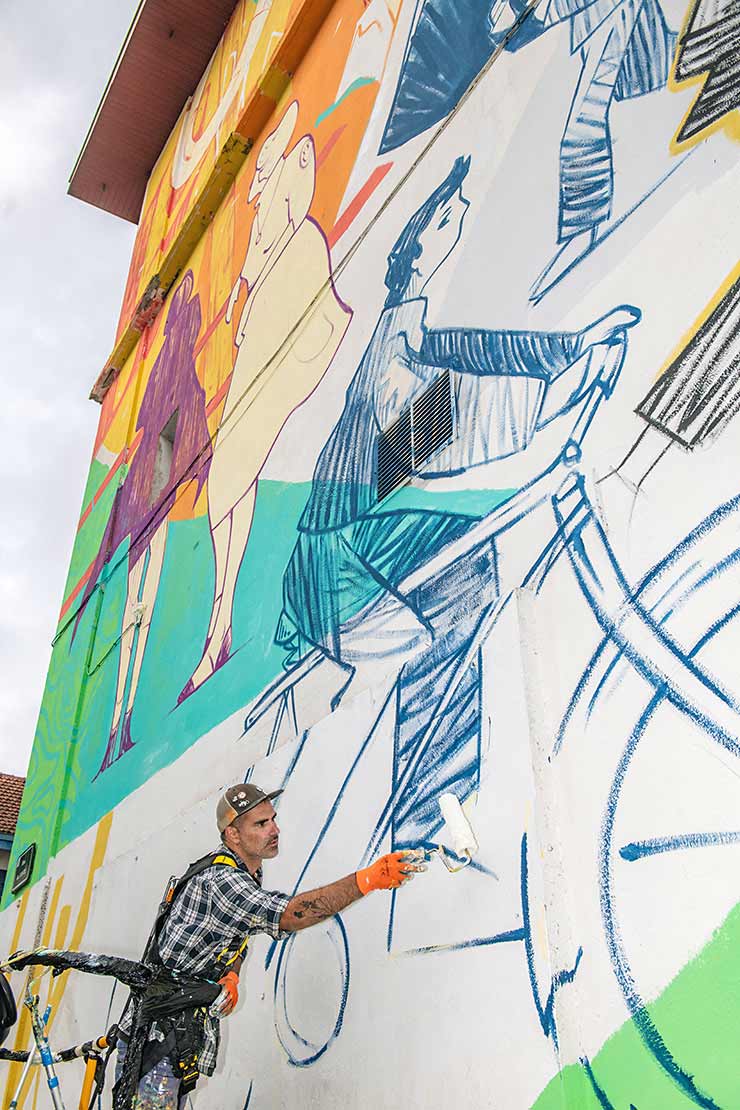
Untay. Points De Vue Festival 2018. Bayonne, France. (photo © Martha Cooper)
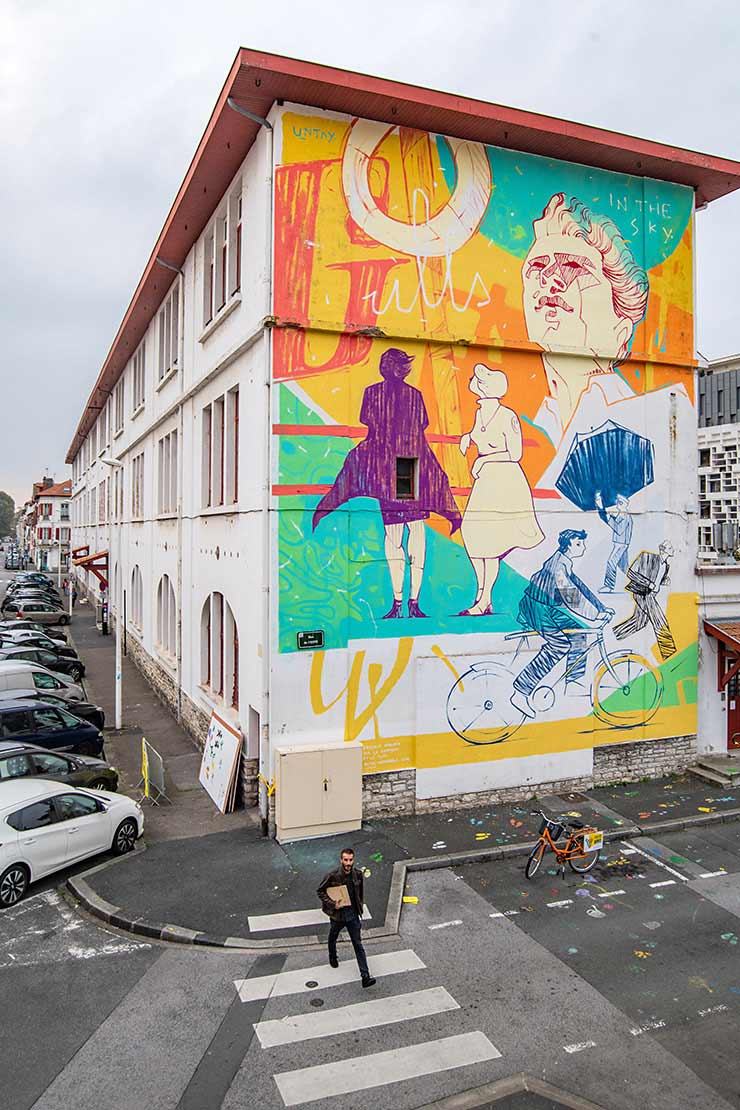
Untay. Points De Vue Festival 2018. Bayonne, France. (photo © Martha Cooper)
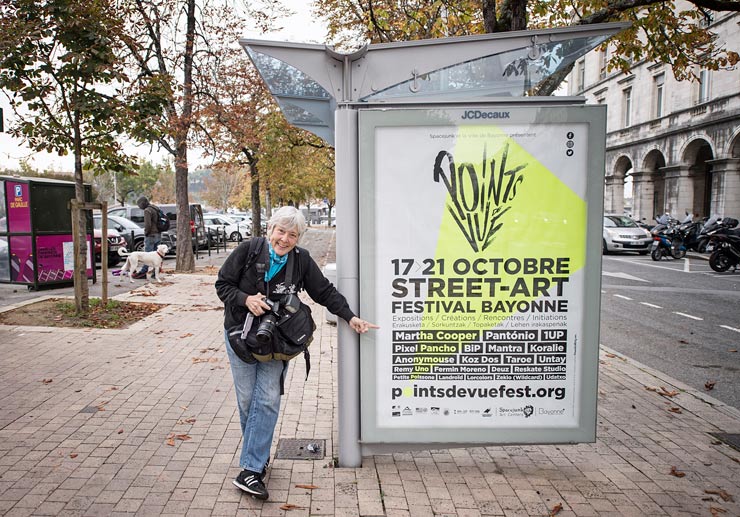
Points De Vue Festival 2018. Bayonne, France. Photo of Martha Cooper by Nika Kramer.
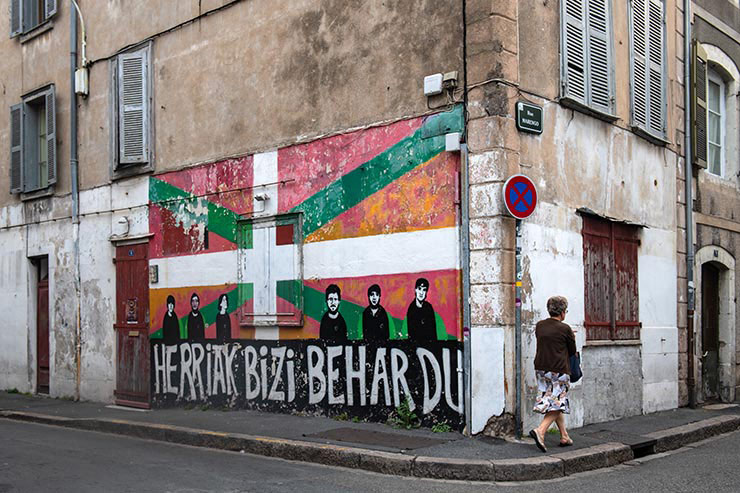
Vintage political mural in Bayonne, France written in the Basque language, translated as “The People Must Live”. (photo © Martha Cooper)
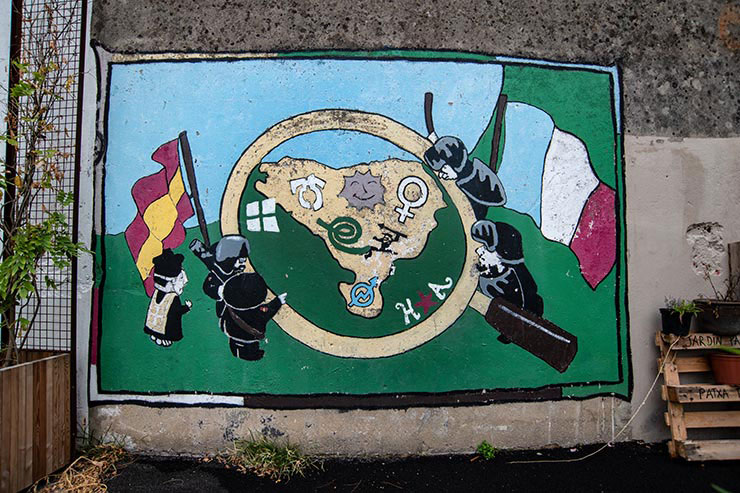
Vintage political mural in Bayonne. (photo © Martha Cooper)
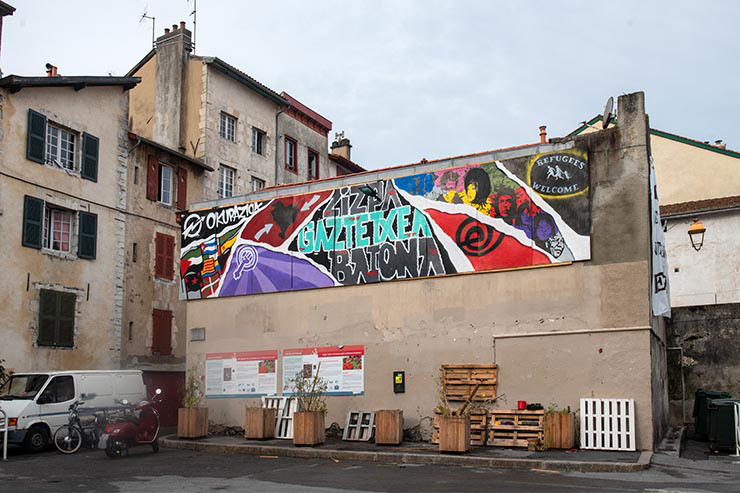
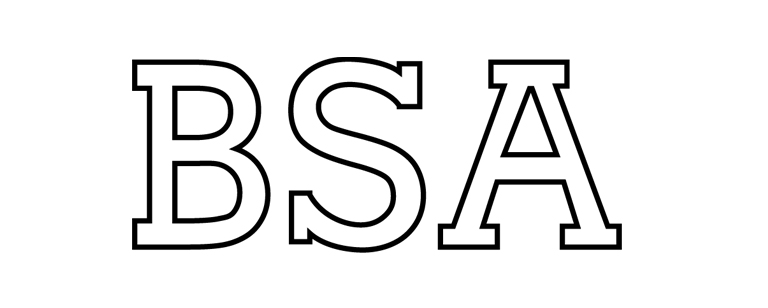 BROOKLYN STREET ART LOVES YOU MORE EVERY DAY
BROOKLYN STREET ART LOVES YOU MORE EVERY DAY
